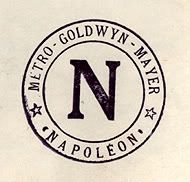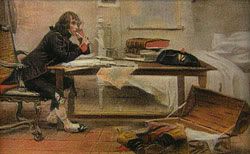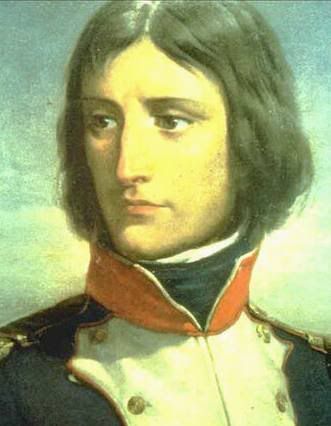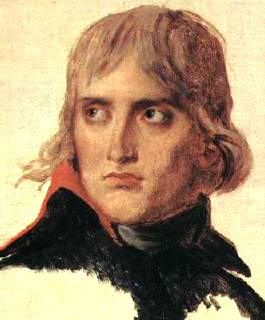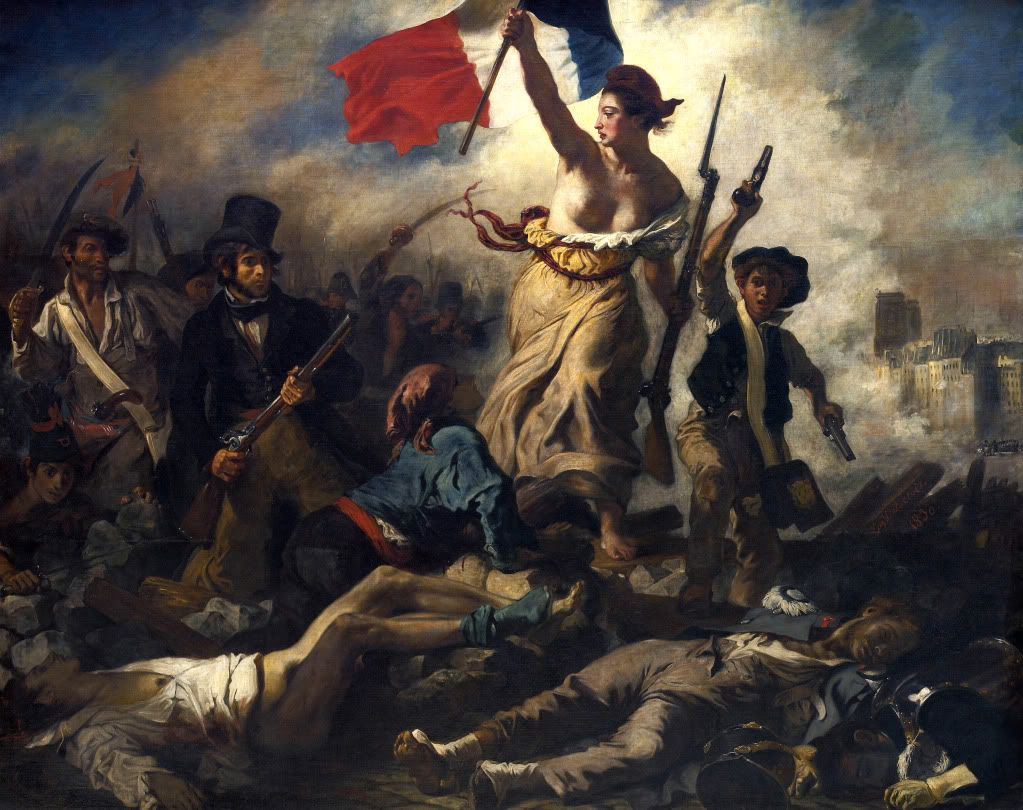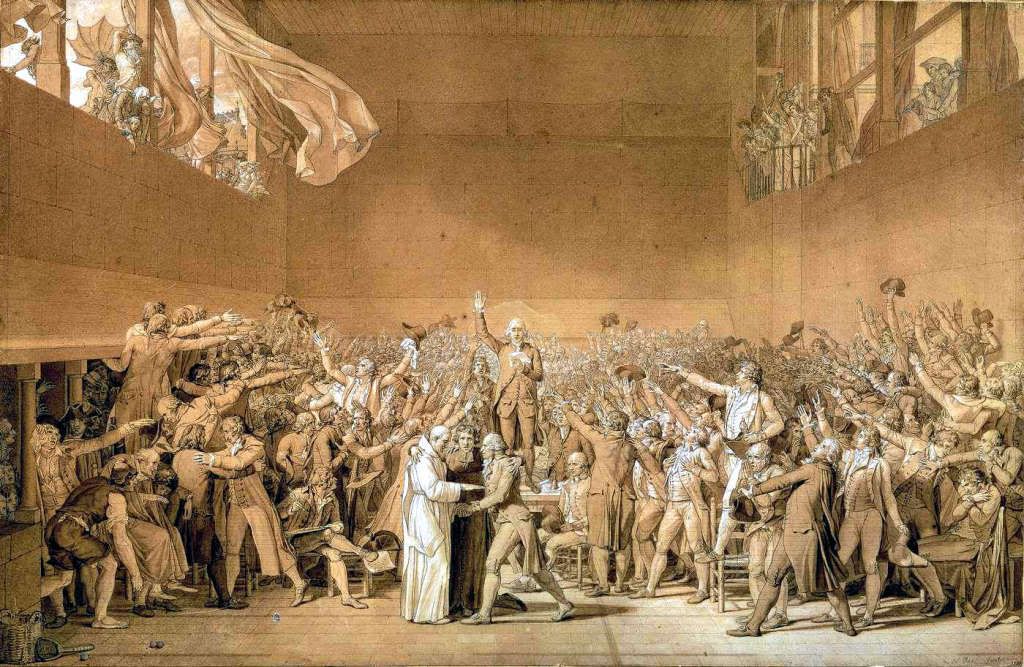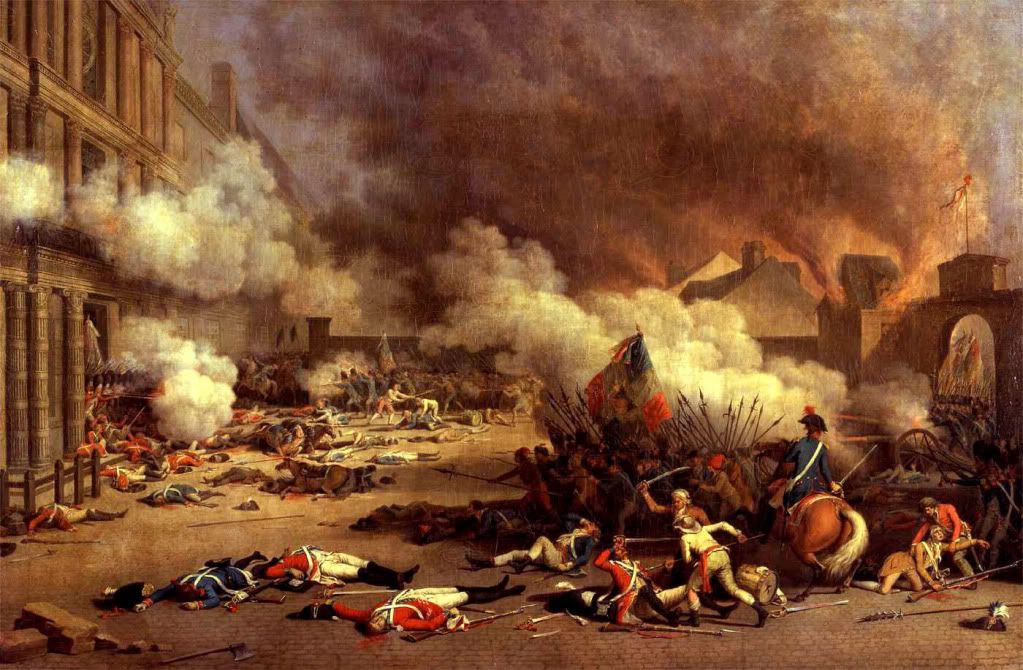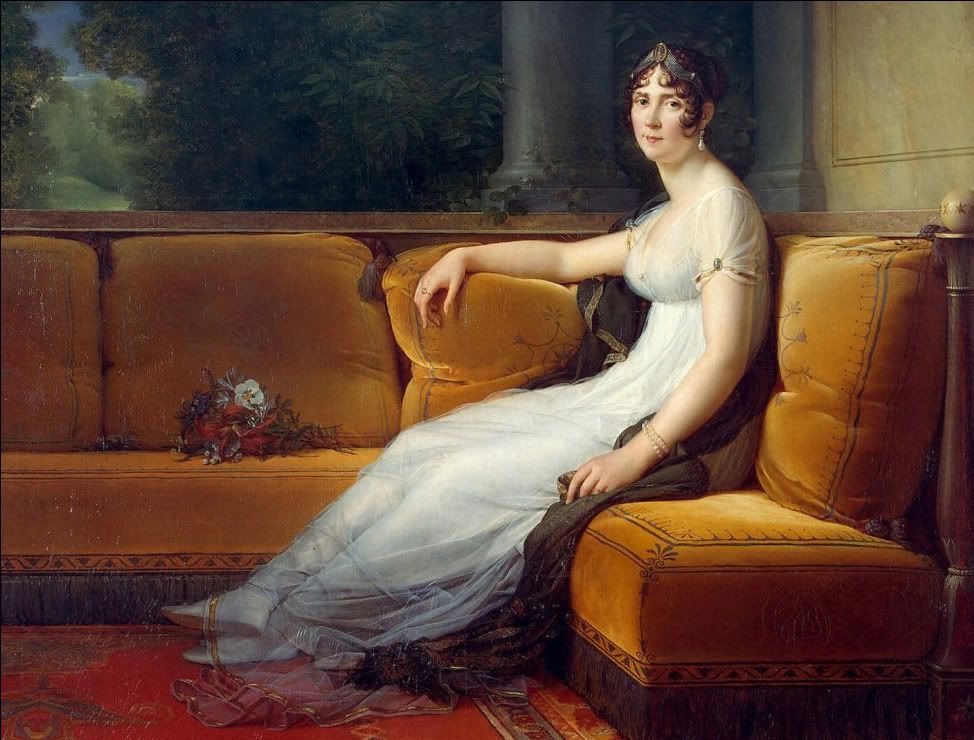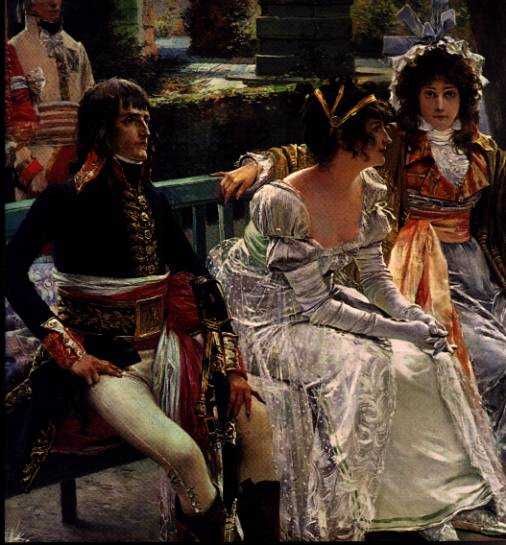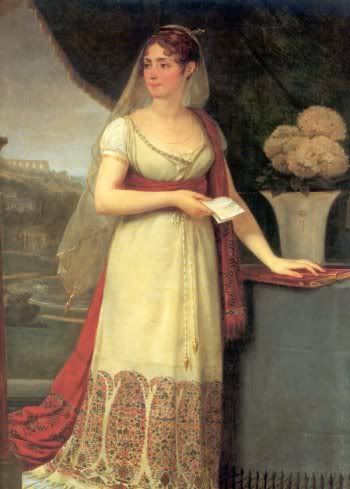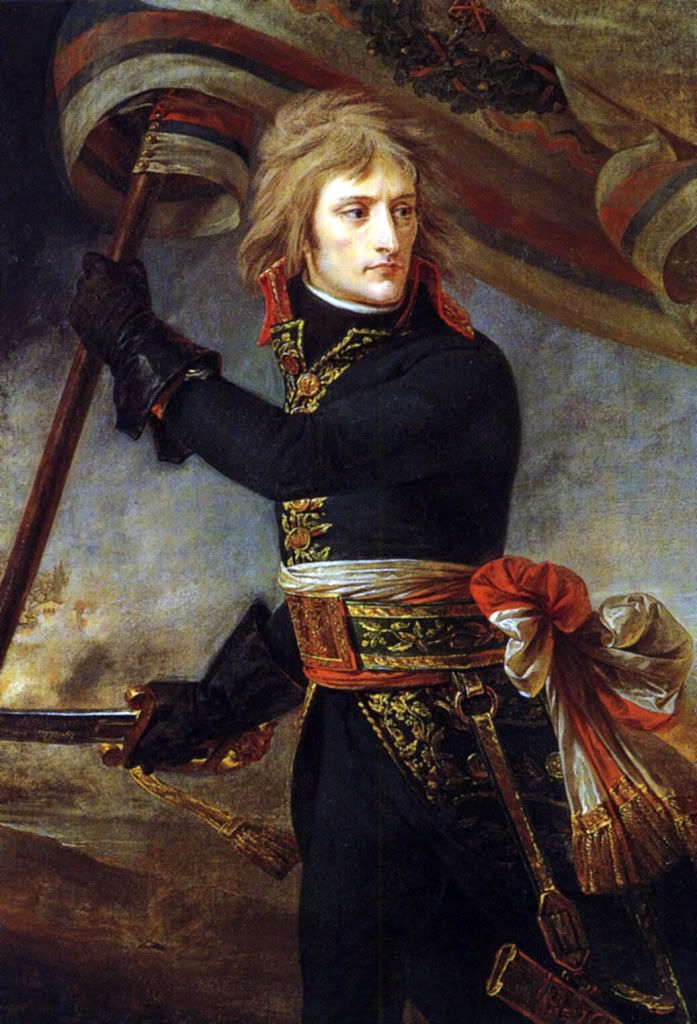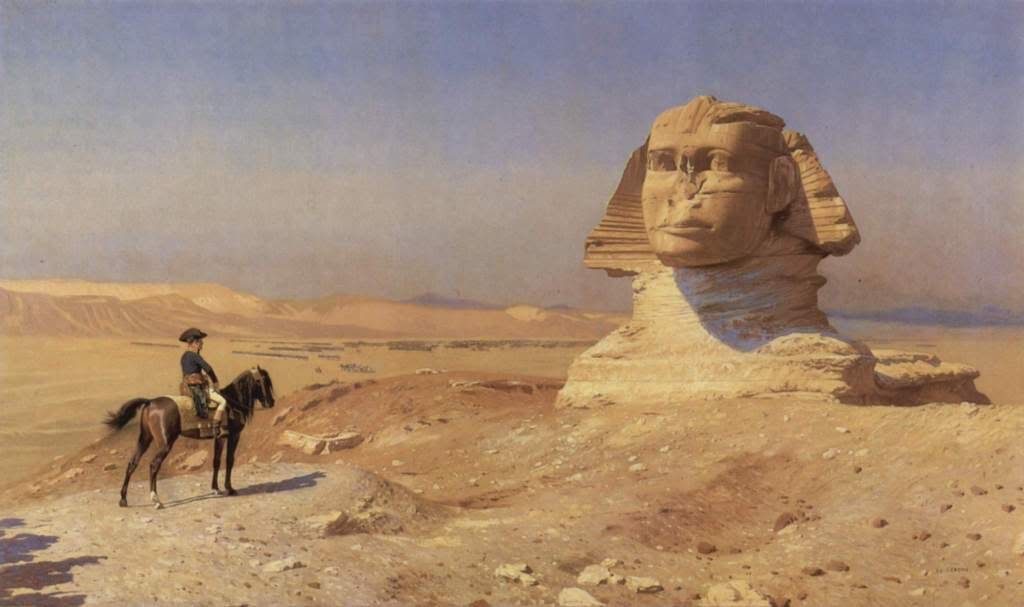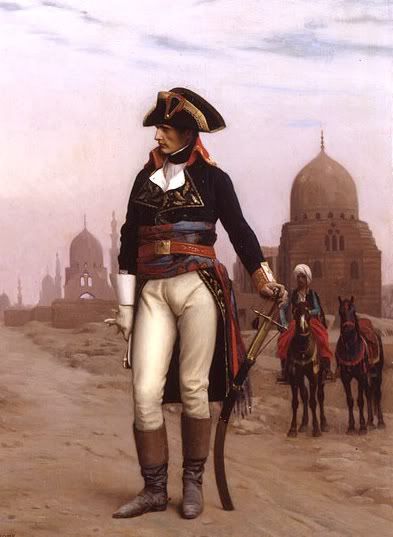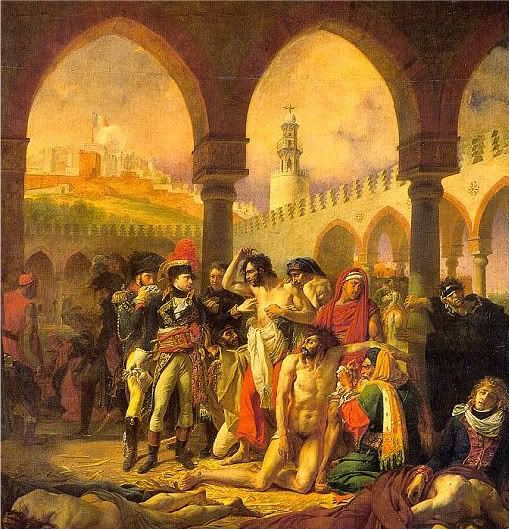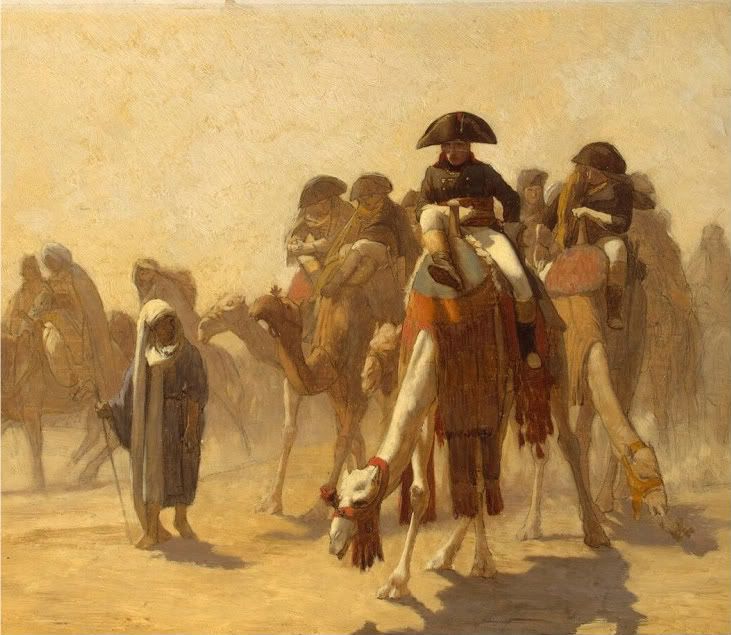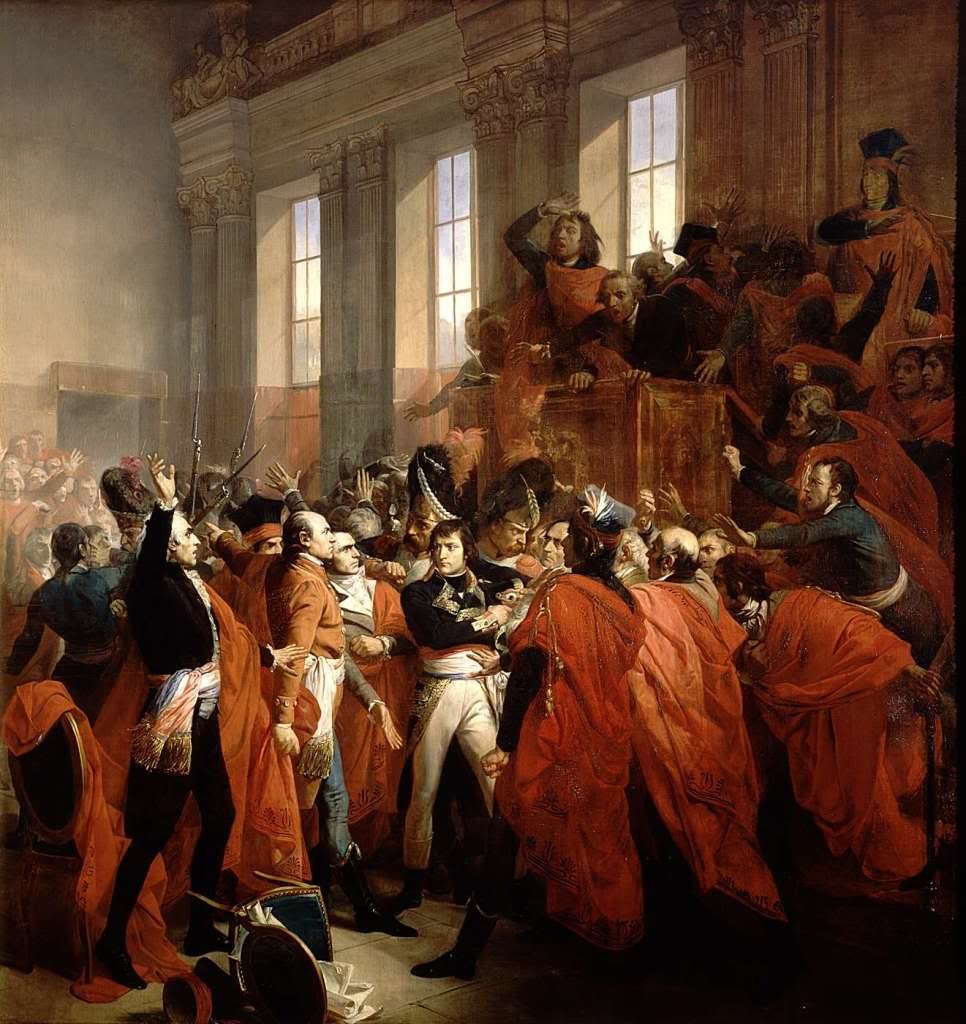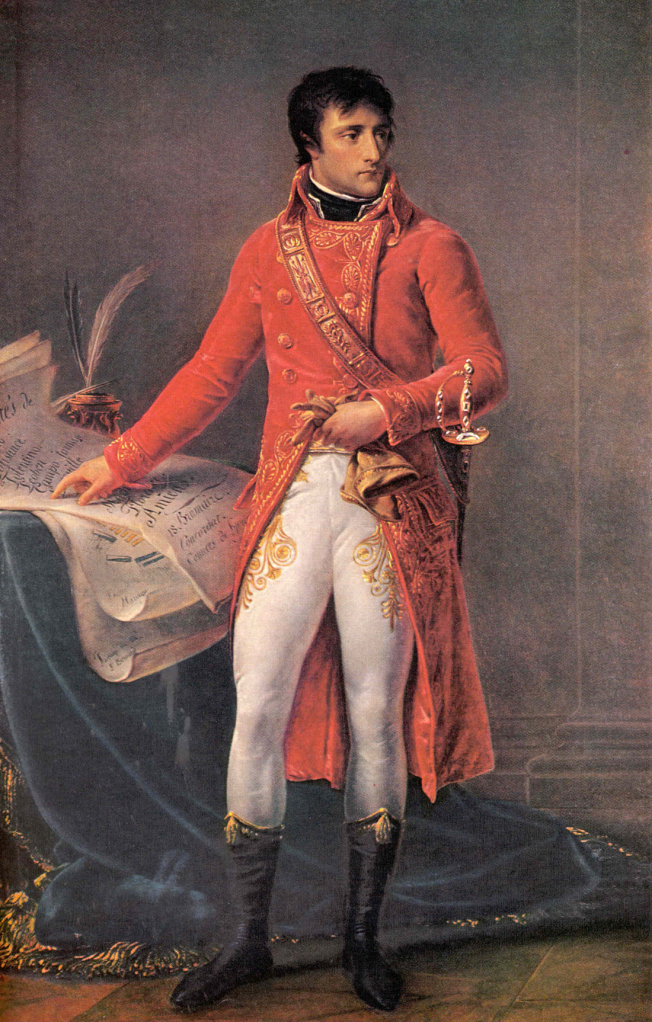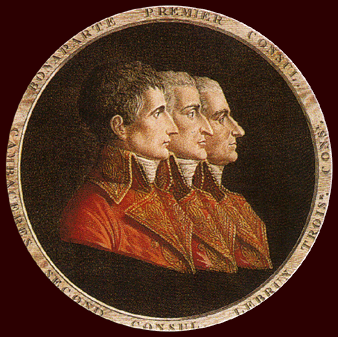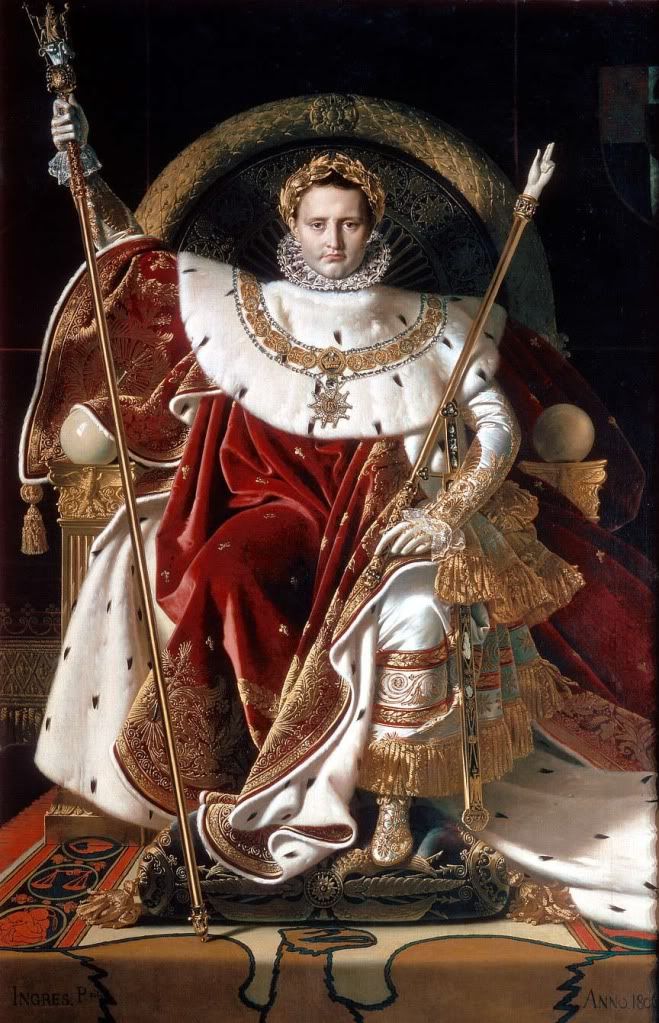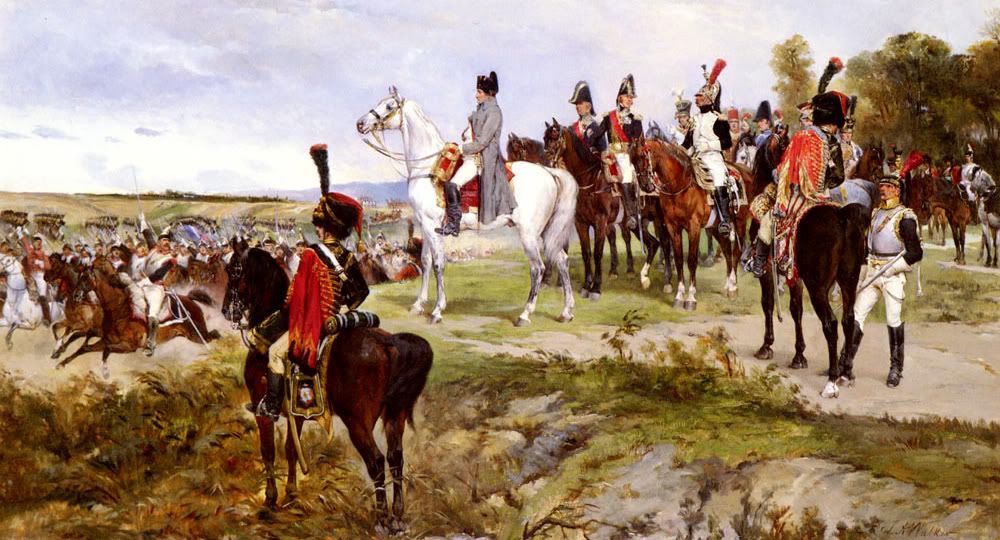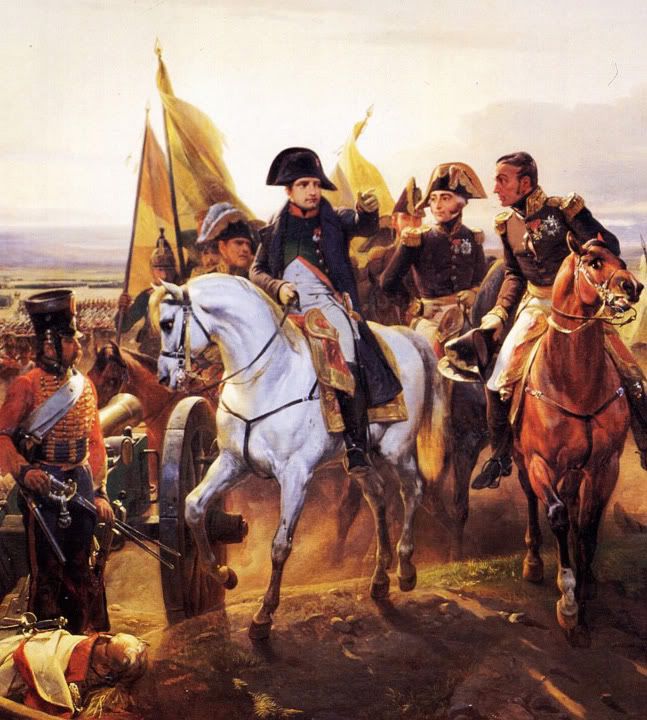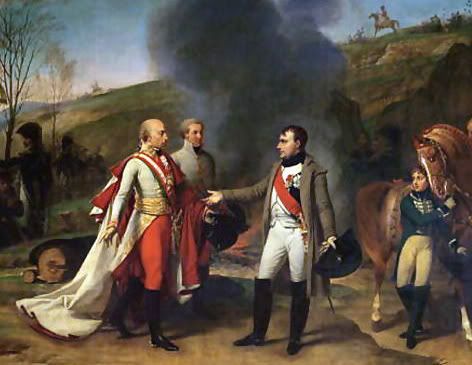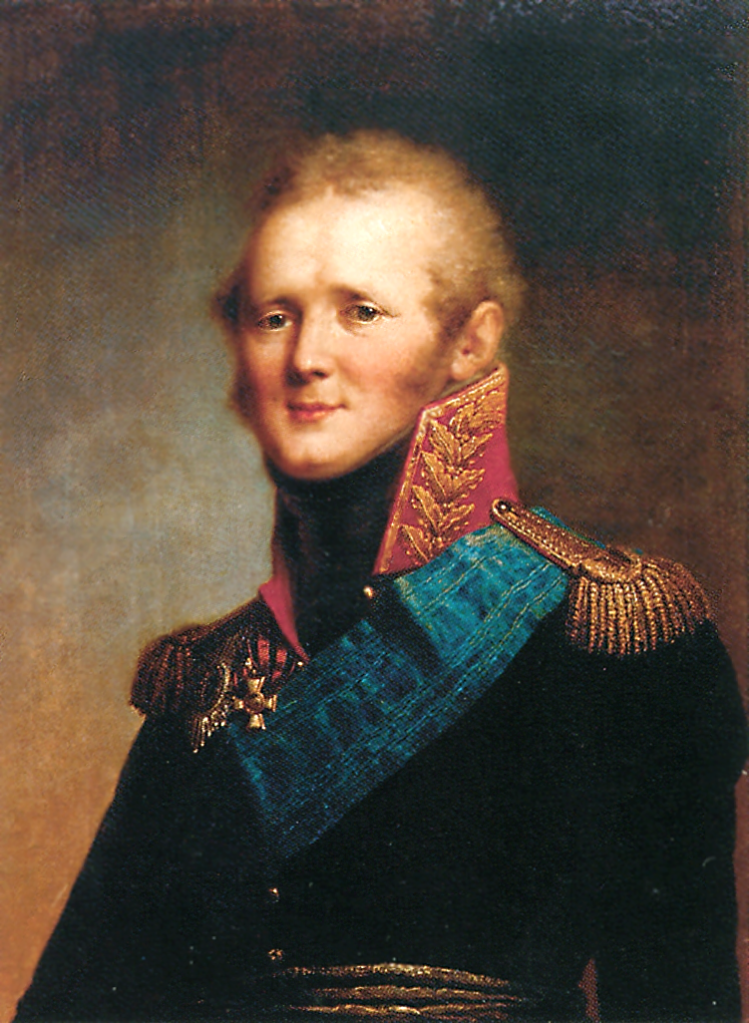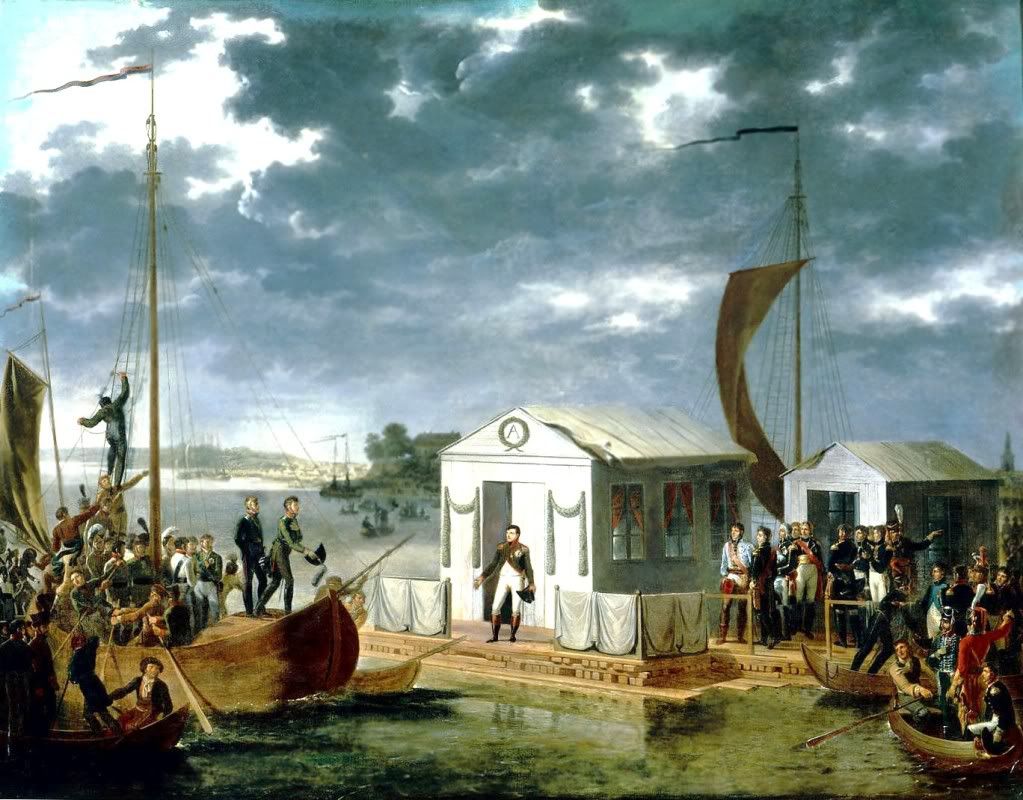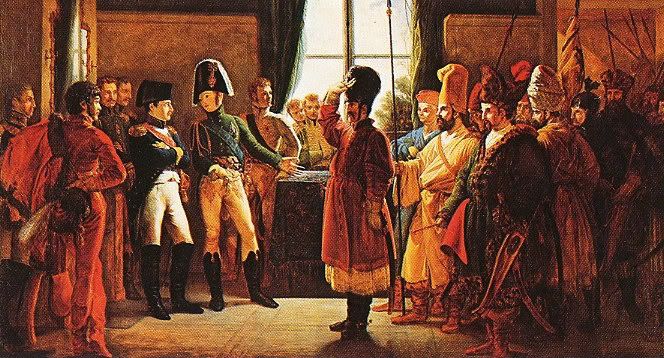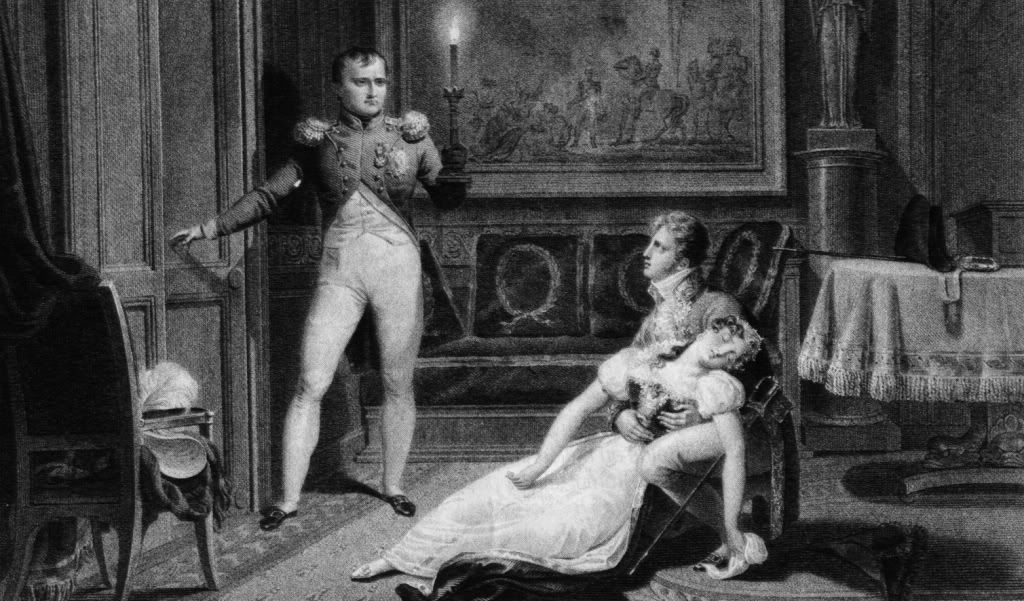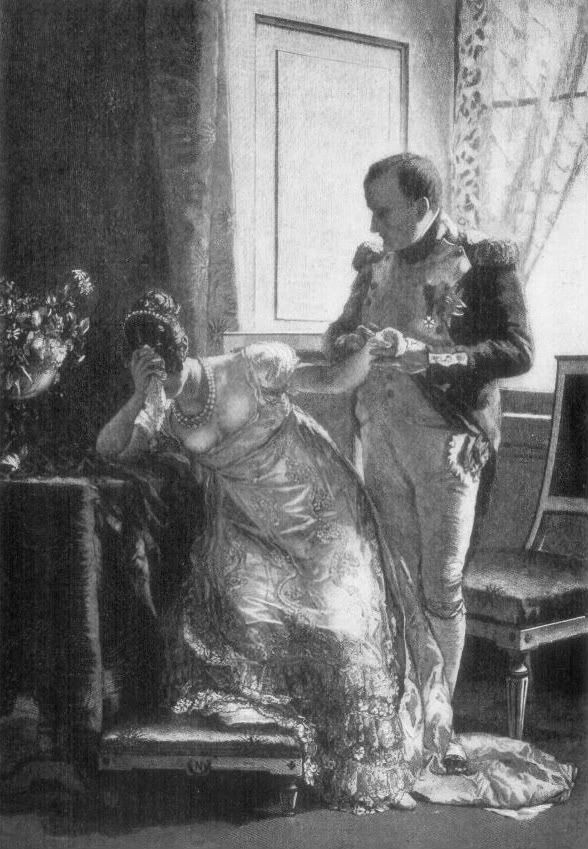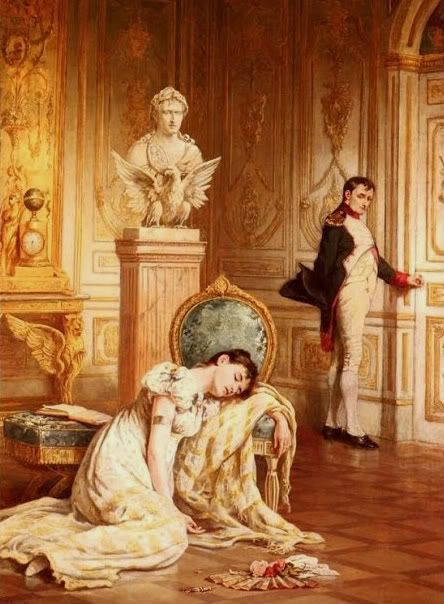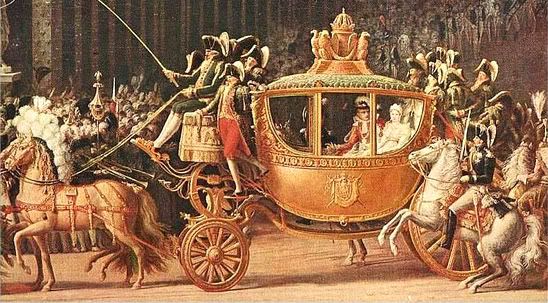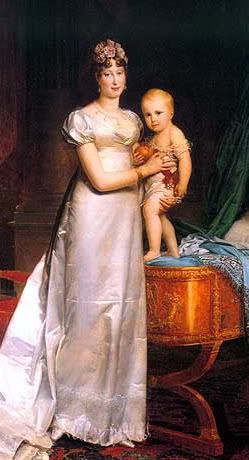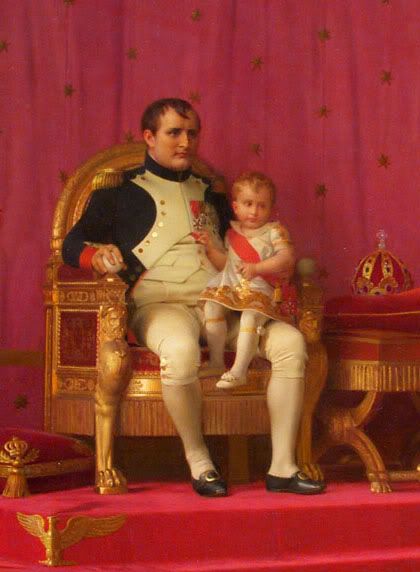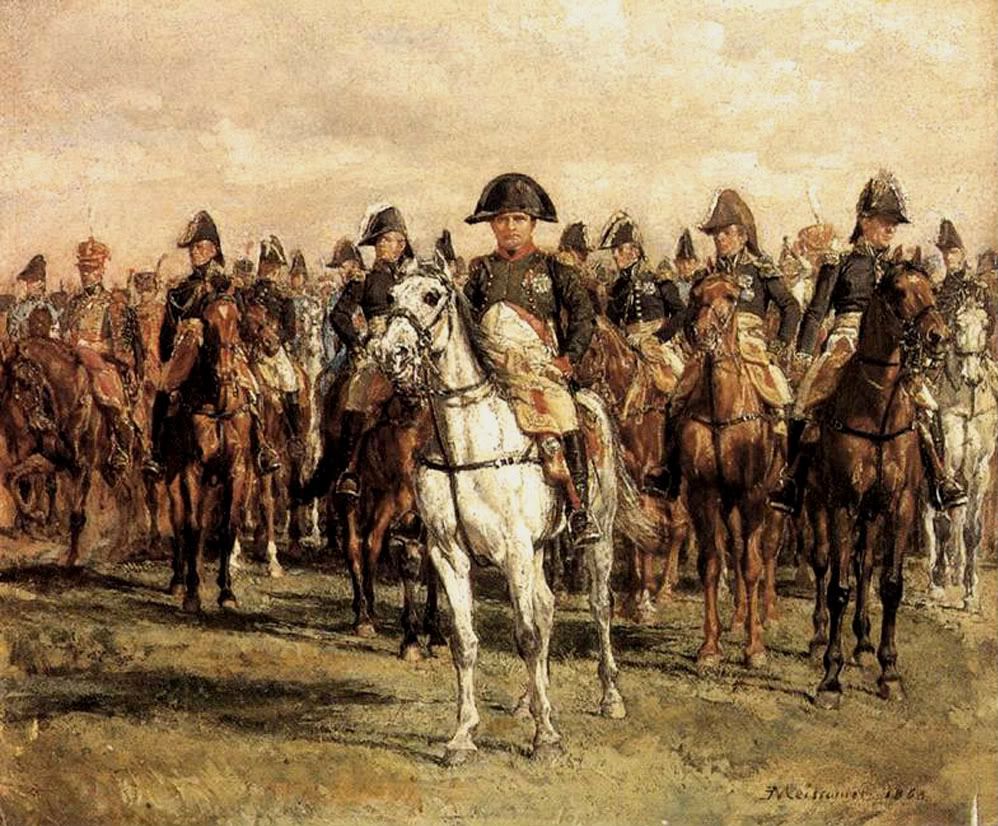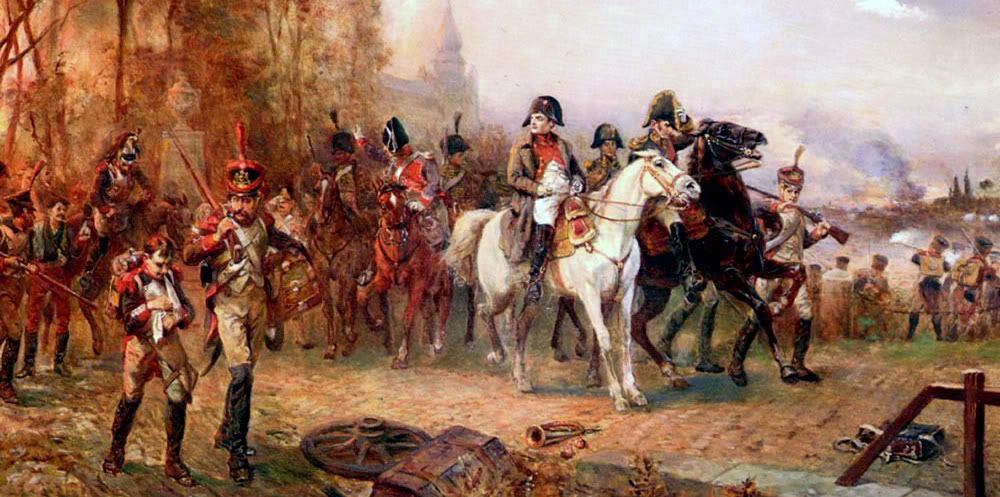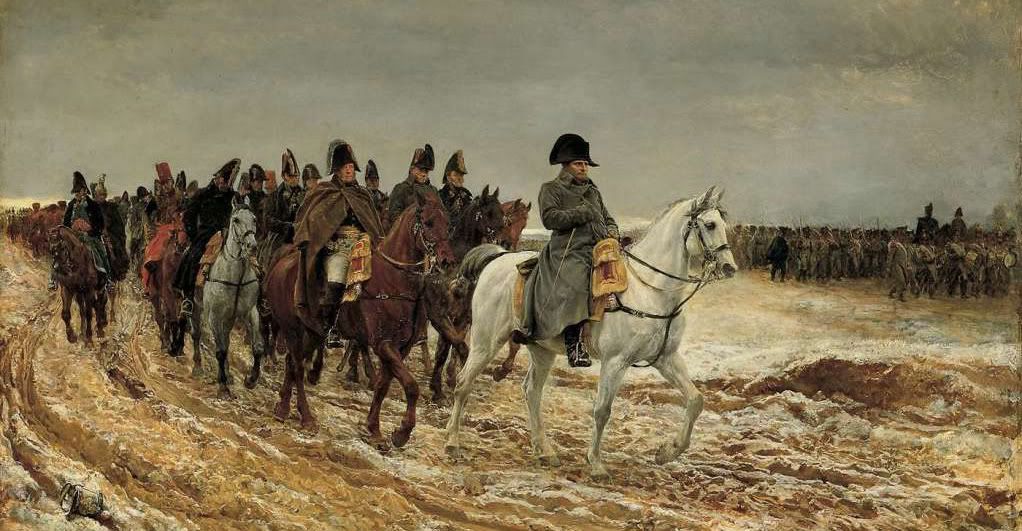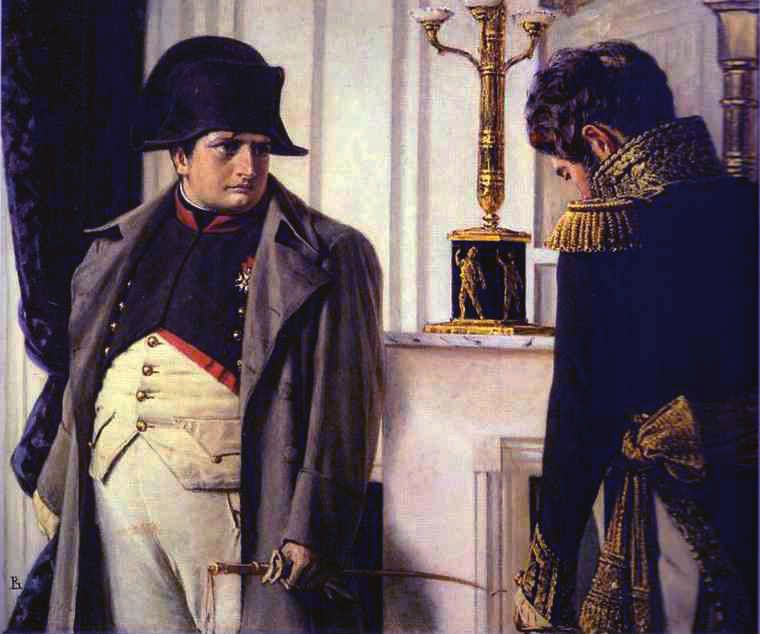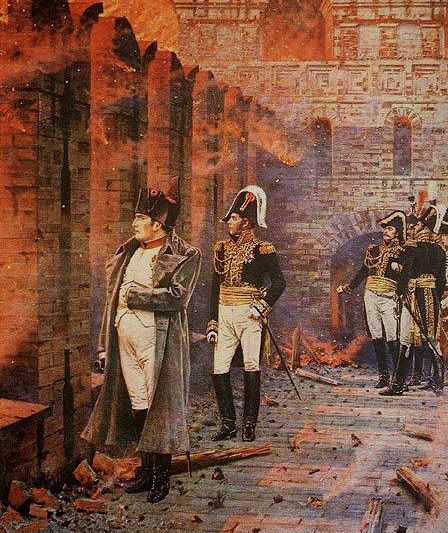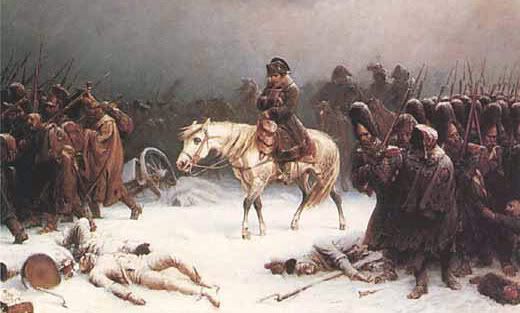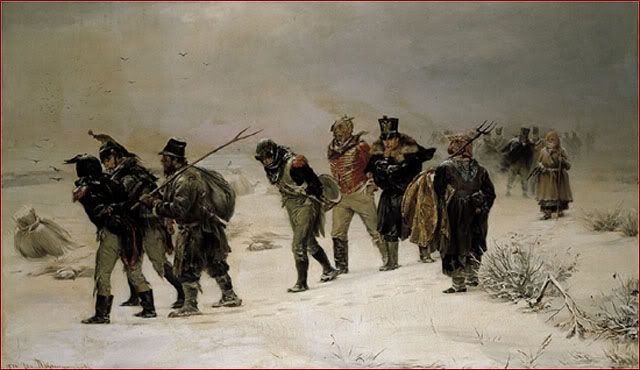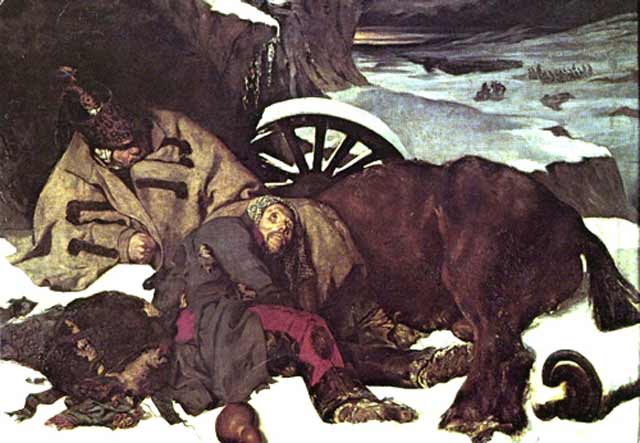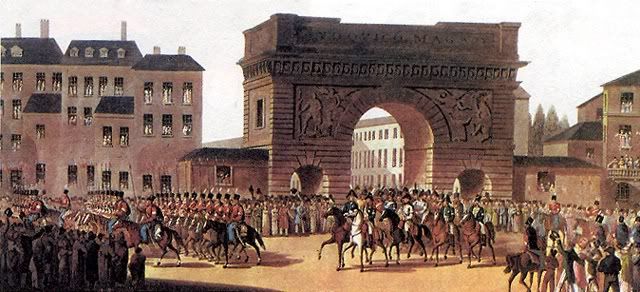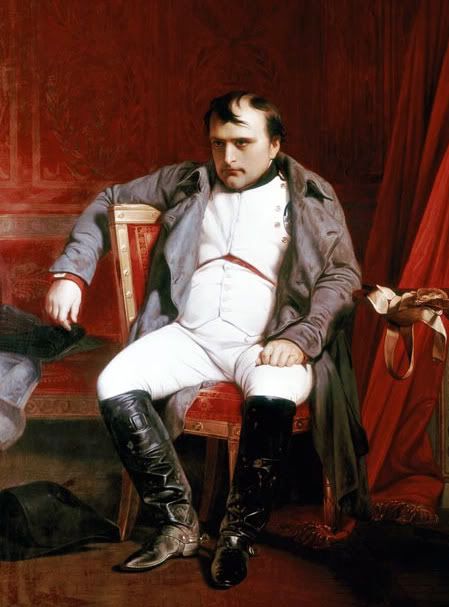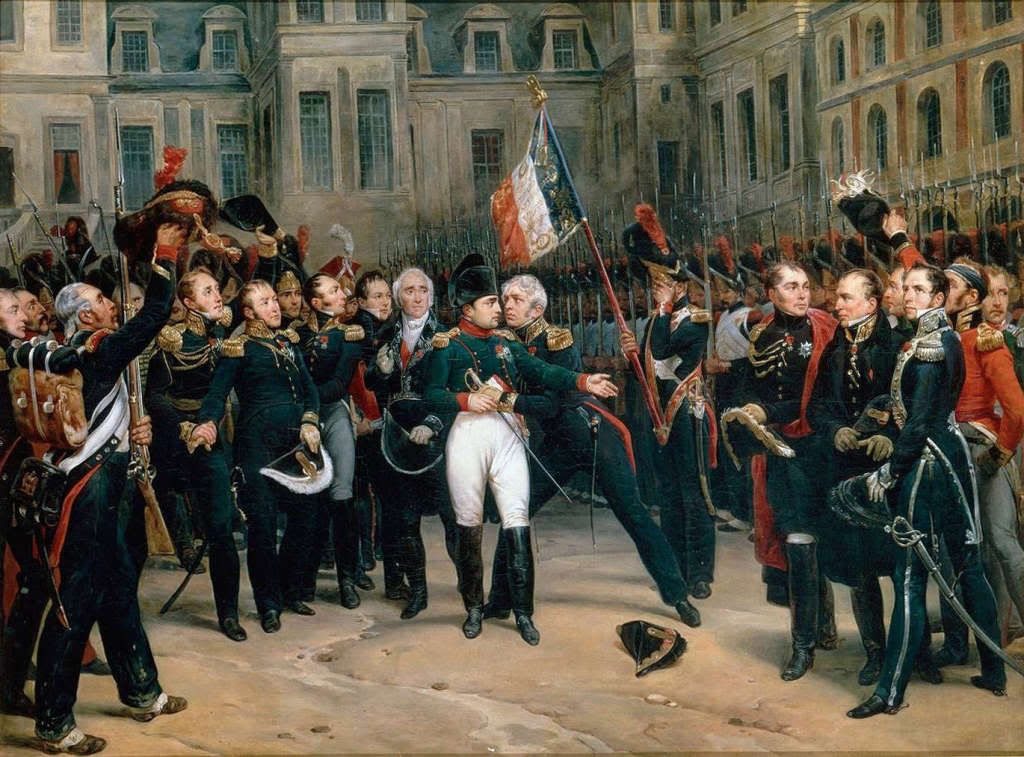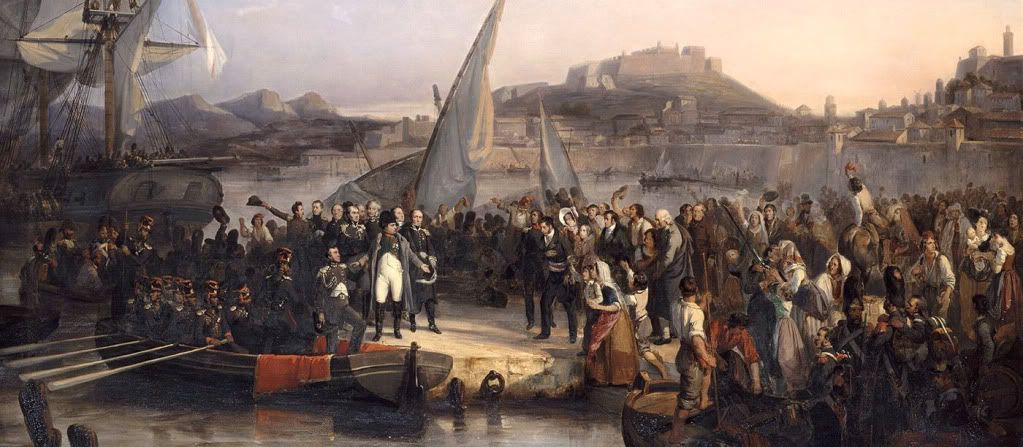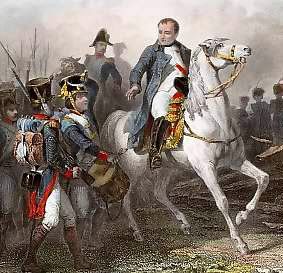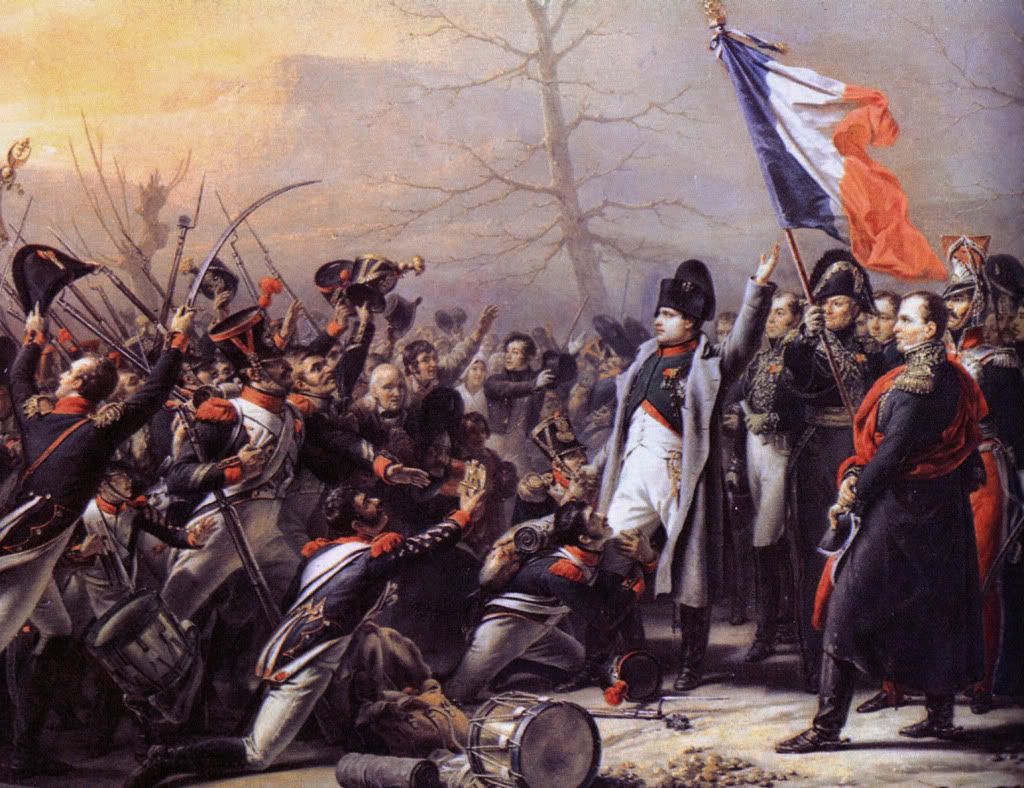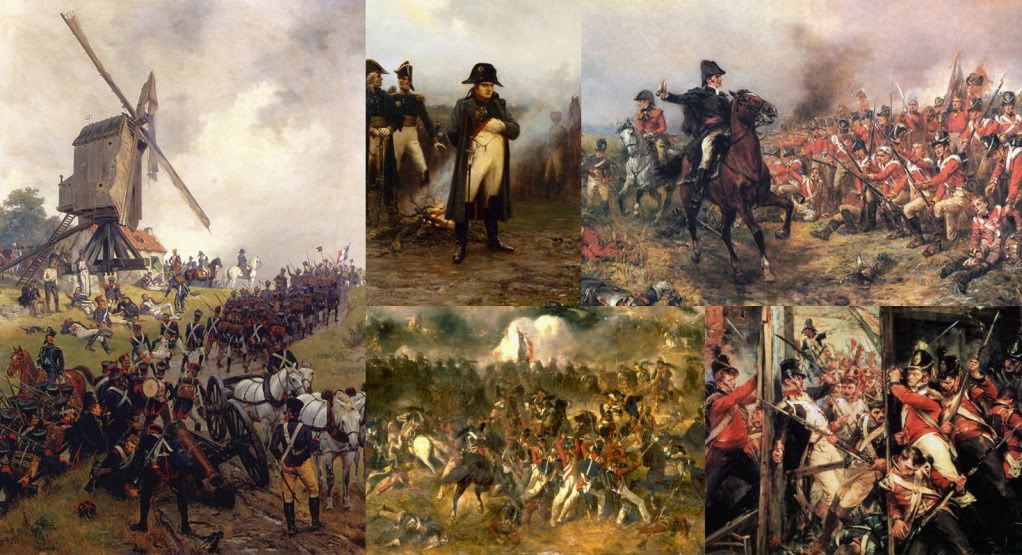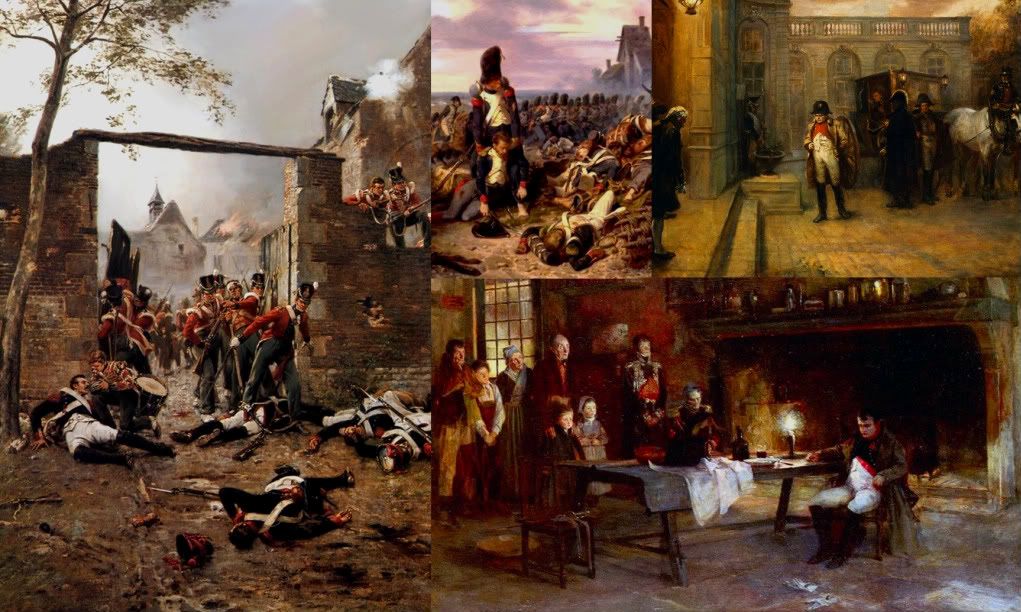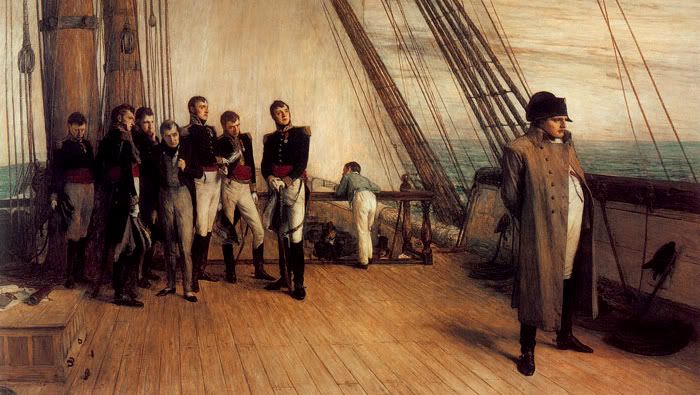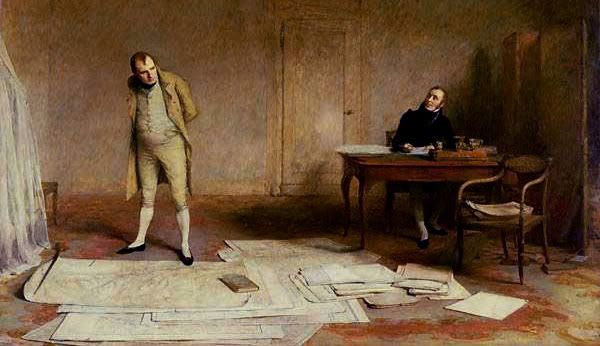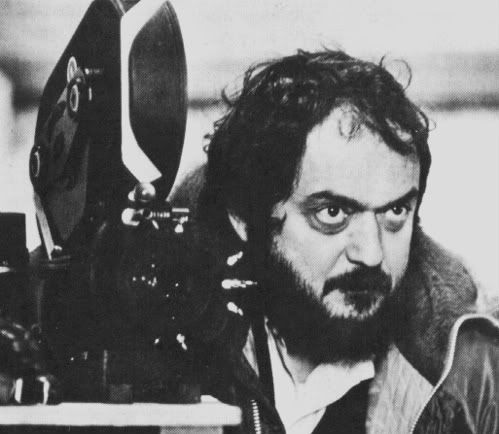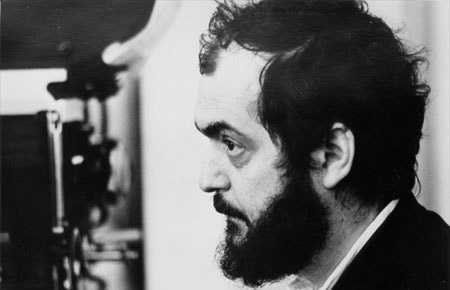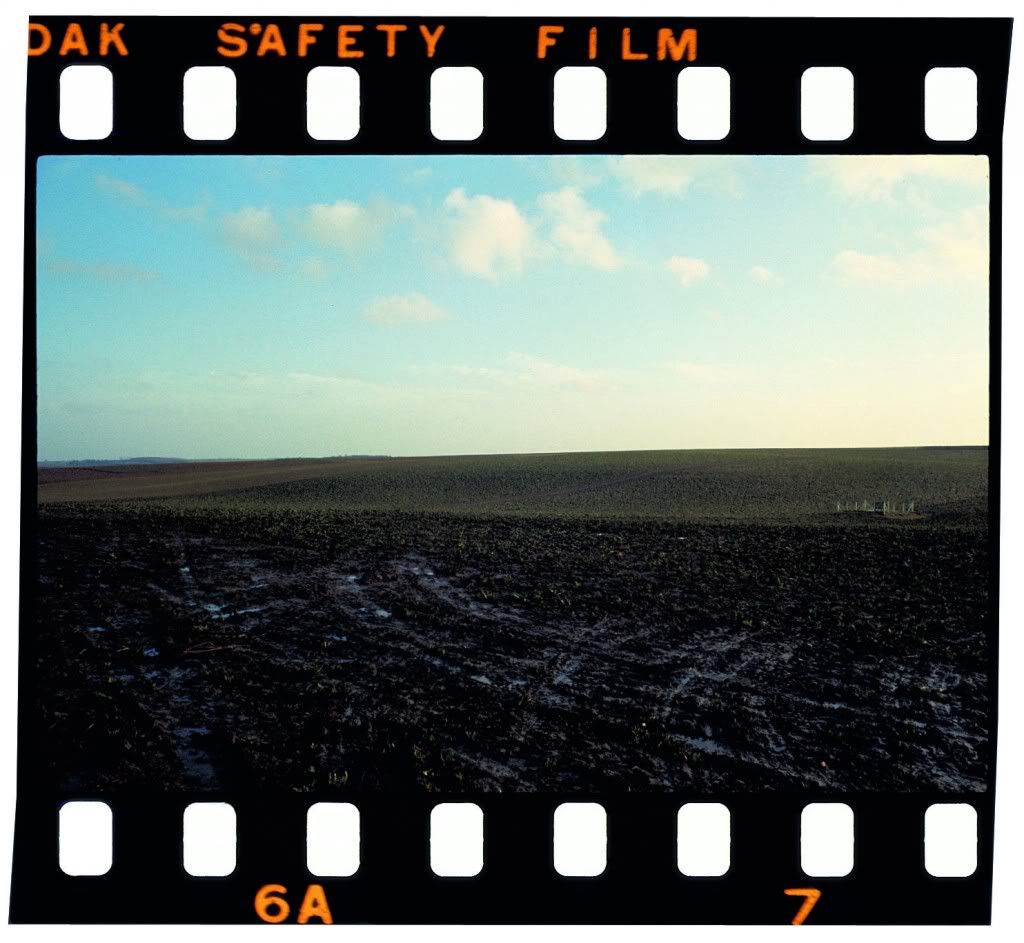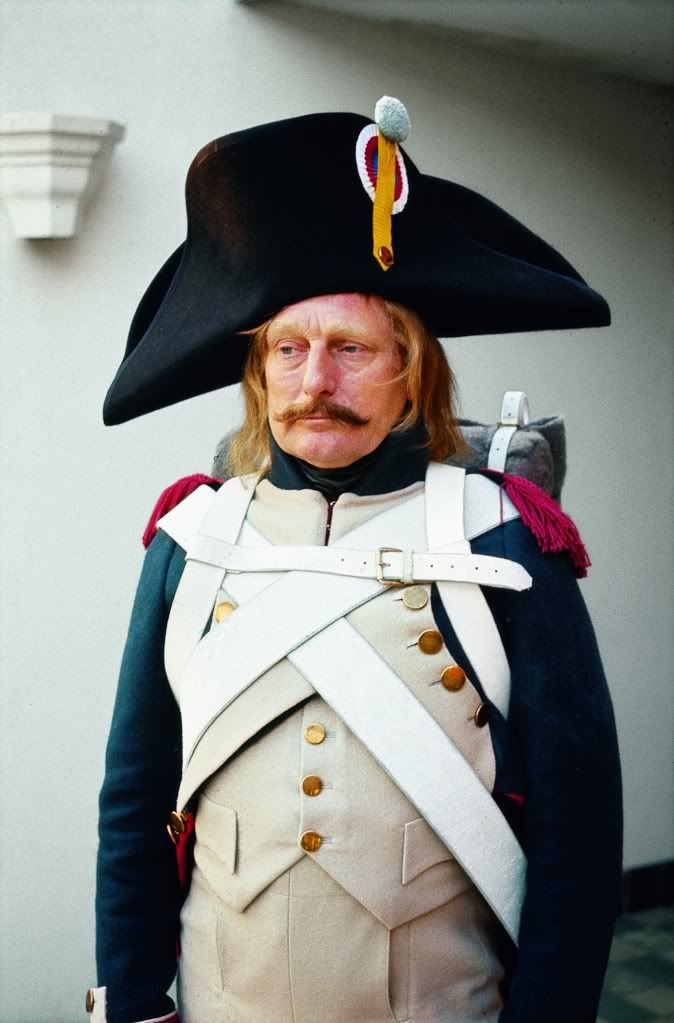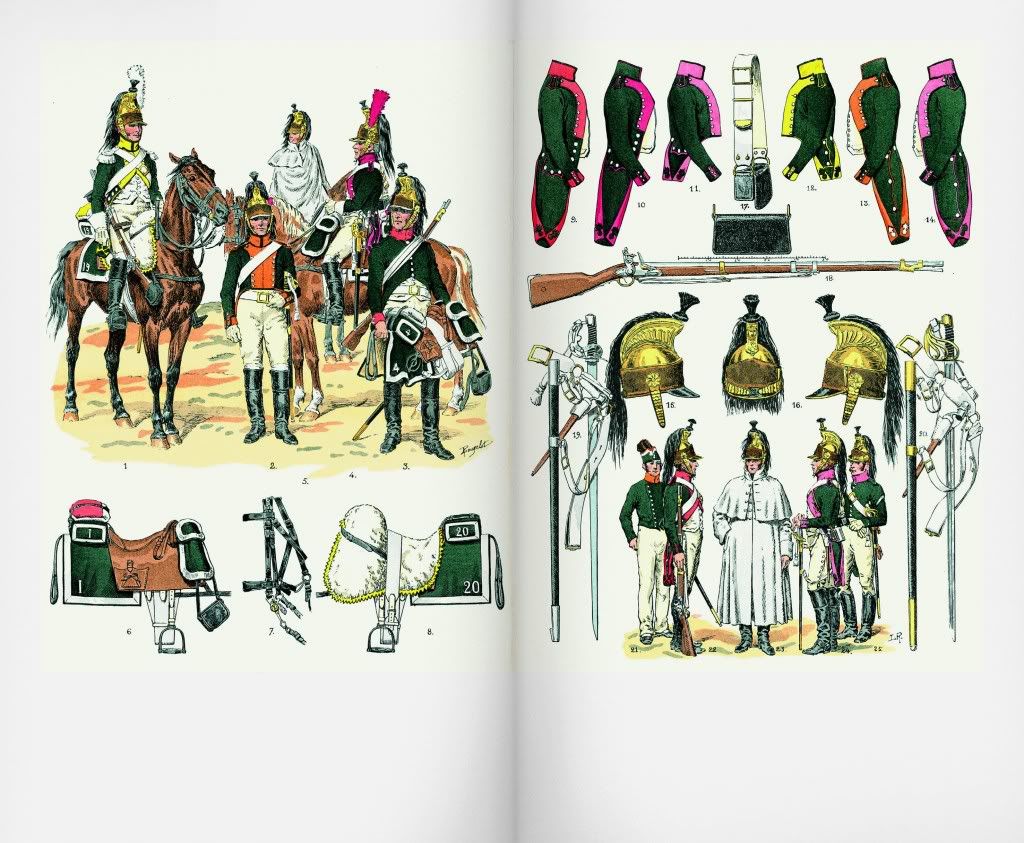Historical setting: Modern Era, France, Europe, French Revolution, Napoleonic Wars, 18th century, 19th century
Genre: Drama, Romance, Political, War
Country: US, UK (Locations: France, Italy, Yugoslavia/Romania)
Language: English
Director: Stanley Kubrick
Genre: Drama, Romance, Political, War
Country: US, UK (Locations: France, Italy, Yugoslavia/Romania)
Language: English
Director: Stanley Kubrick
"There's a weird disparity between the sheer visual and organizational beauty of the historical battles and their human consequences. It's rather like watching two golden eagles soaring through the sky from a distance; they may be tearing a dove to pieces, but if you are far enough away the scene is still beautiful." - Stanley Kubrick
PLOT SUMMARY
CHILDHOOD AND EARLY LIFE:
Napoleon is 4 years old and listens to a story told by his mother.
Napoleon is 9, he was enrolled first at a religious school and then he was accepted at the Royal Military College at Brienne. He likes to read classical texts such as Caesar’s Conquest of Gaul, but he is a lonely child with a strong character. He fights his peers after their provocation.
Napoleon is 16. He has graduated and now is posted to the crack regiment at Valence, where he continues his military career. He is still lonely and sad for being so different from the others.
At the age of 17 he knows a girl whom he writes his first letter of flirtation.
Streets of Lyon in a cold winter night. Napoleon encounters a very young, sweet and innocent prostitute. Napoleon, very shy, accepts her offering for three francs and brings her to his cheap hotel room and has his first sexual encounter.
Napoleon is 9, he was enrolled first at a religious school and then he was accepted at the Royal Military College at Brienne. He likes to read classical texts such as Caesar’s Conquest of Gaul, but he is a lonely child with a strong character. He fights his peers after their provocation.
Napoleon is 16. He has graduated and now is posted to the crack regiment at Valence, where he continues his military career. He is still lonely and sad for being so different from the others.
At the age of 17 he knows a girl whom he writes his first letter of flirtation.
Streets of Lyon in a cold winter night. Napoleon encounters a very young, sweet and innocent prostitute. Napoleon, very shy, accepts her offering for three francs and brings her to his cheap hotel room and has his first sexual encounter.
FRENCH REVOLUTION:
1789 (2 or 3 years later). A small Revolutionary Committee is having place in a town square. Napoleon appears leading a little detachment of French troops having orders to arrest the leader of the meeting charged of murdering a royalist. He refuses being arrested and Napoleon shoots him dead.
In another scene Napoleon is outraged when he learns of a mob storming the Tuileries Palace where the royal family was forced to stay during the Revolution.
[Narrator: In 1793 the British along the Royalists have captured the naval base of Toulon. The French fail to retake it, so Paul Barras, former viscount and new Citizen Deputy from the Committee of Public Safety is sent to report on the situation].
In a meeting with Barras and the generals, Napoleon, now captain of artillery, audaciously proposes to Barras his plan to recapture Toulon.
After the victory Napoleon is publicly honoured by Barras, being Napoleon’s mother among the witnesses.
In 1794 Robespierre is deposed and murdered and his Reign of Terror comes to an end. Barras celebrates a party for the “jet set” in his mansion. Napoleon is invited. Most women are displaying their breast completely uncovered, and there are entertainers performing an orgy for the guests to watch. Napoleon meets Josephine, who is currently Barras mistress.
[Narrator: Renewed unrest and revolts spread through Paris, as the new Government proves to be inept, corrupt and unpopular].
Barras asks help and advice from Napoleon and gives to him command of the improvised forces in defence of the Convention in the Tuileries Palace.
Napoleon has ordered a young cavalry officer, Joachim Murat, to seize large cannons and use them to repel the attackers. Many from the mob die and the rest flee. [The crisis is over, Barras becomes the head of the new government of the Directory and Napoleon is made Commander of the Army of Italy].
In another scene Napoleon is outraged when he learns of a mob storming the Tuileries Palace where the royal family was forced to stay during the Revolution.
[Narrator: In 1793 the British along the Royalists have captured the naval base of Toulon. The French fail to retake it, so Paul Barras, former viscount and new Citizen Deputy from the Committee of Public Safety is sent to report on the situation].
In a meeting with Barras and the generals, Napoleon, now captain of artillery, audaciously proposes to Barras his plan to recapture Toulon.
After the victory Napoleon is publicly honoured by Barras, being Napoleon’s mother among the witnesses.
In 1794 Robespierre is deposed and murdered and his Reign of Terror comes to an end. Barras celebrates a party for the “jet set” in his mansion. Napoleon is invited. Most women are displaying their breast completely uncovered, and there are entertainers performing an orgy for the guests to watch. Napoleon meets Josephine, who is currently Barras mistress.
[Narrator: Renewed unrest and revolts spread through Paris, as the new Government proves to be inept, corrupt and unpopular].
Barras asks help and advice from Napoleon and gives to him command of the improvised forces in defence of the Convention in the Tuileries Palace.
Napoleon has ordered a young cavalry officer, Joachim Murat, to seize large cannons and use them to repel the attackers. Many from the mob die and the rest flee. [The crisis is over, Barras becomes the head of the new government of the Directory and Napoleon is made Commander of the Army of Italy].
JOSEPHINE:
In Paris, General Bonaparte has issued an order so all citizens must hand over any weapon they have in their possession. A young man called Eugene, Josephine’s son, goes to Napoleon office and asks him to make an exception because of his deceased father’s sword, who was a general.
The next day Napoleon visits Josephine at her house to give back the sword. They chat friendly.
In the next scene they’re making love in an oval bedroom completely encircled with floor-to-ceiling mirrors. Napoleon voice-over reads a love letter, "I awake full of you. Your image and the memory of last night’s intoxicating pleasures has left no rest to my senses."
Napoleon and Josephine get married in a small private ceremony. Josephine voice-over reads a letter to someone called Theresa; she confess not loving Napoleon and feeling indifferent to him.
Napoleon visits her mother at Marseille; she is upset because Napoleon didn’t write him about the wedding.
Excerpts from Napoleon’s letters to Josephine are read over different scenes showing Josephine’s affair with Hussar lieutenant Hippolyte Charles, them making love in a mirrored room, Napoleon writing the letters and his life in camp and on the march in the campaign of Italy. In the letters Napoleon’s love becomes more obsessive as Josephine doesn’t answer to his letters.
The next day Napoleon visits Josephine at her house to give back the sword. They chat friendly.
In the next scene they’re making love in an oval bedroom completely encircled with floor-to-ceiling mirrors. Napoleon voice-over reads a love letter, "I awake full of you. Your image and the memory of last night’s intoxicating pleasures has left no rest to my senses."
Napoleon and Josephine get married in a small private ceremony. Josephine voice-over reads a letter to someone called Theresa; she confess not loving Napoleon and feeling indifferent to him.
Napoleon visits her mother at Marseille; she is upset because Napoleon didn’t write him about the wedding.
Excerpts from Napoleon’s letters to Josephine are read over different scenes showing Josephine’s affair with Hussar lieutenant Hippolyte Charles, them making love in a mirrored room, Napoleon writing the letters and his life in camp and on the march in the campaign of Italy. In the letters Napoleon’s love becomes more obsessive as Josephine doesn’t answer to his letters.
ITALIAN CAMPAIGN:
Start of the 1st Italian campaign. The French defeat the Austrians in dozens of battles. [Napoleon puts into practice a new era of offensive warfare, maneuver and mobility while he becomes a notable figure in French and European affairs].
The entrance of the French troops into Milan is triumphant, wildly enthusiastic crowds receive them. [Napoleon acts like a ruler in Italy, his increasing popularity and political influence raise suspicion and resentment from the Directory in Paris].
Josephine journeys to Milan. While making love with Napoleon her voice reads over another letter to Therese: “I am bored to death. My husband doesn't love me, he worships me. I fear he will go mad with love. Worse than that, I fear for my poor Hippolyte”.
Napoleon receives an anonymous letter denouncing Josephine and Hippolyte affair. Napoleon asks opinion from his brother Joseph and his aide Major Junot. They tell him they know nothing about it (some hints implying they may be lying), so Napoleon thinks it’s just a defamatory letter.
The entrance of the French troops into Milan is triumphant, wildly enthusiastic crowds receive them. [Napoleon acts like a ruler in Italy, his increasing popularity and political influence raise suspicion and resentment from the Directory in Paris].
Josephine journeys to Milan. While making love with Napoleon her voice reads over another letter to Therese: “I am bored to death. My husband doesn't love me, he worships me. I fear he will go mad with love. Worse than that, I fear for my poor Hippolyte”.
Napoleon receives an anonymous letter denouncing Josephine and Hippolyte affair. Napoleon asks opinion from his brother Joseph and his aide Major Junot. They tell him they know nothing about it (some hints implying they may be lying), so Napoleon thinks it’s just a defamatory letter.
EGYPTIAN CAMPAIGN:
[Narrator: 1798. Napoleon has arrived in Egypt with an army of 40,000 men and a large party of scientists (mathematicians, naturalists, chemists and geodesists). The Directory approved his plan for attacking England, indirectly, through their Eastern Empire and blocking their trade with India, rather than by invasion of Britain].
Napoleon and the scientists visit the Sphinx, in another scene they examine a mummy. [They would found the Institute of Egypt, do the preliminary survey work for the Suez canal, and unlock the key to hieroglyphic writing thanks to the Rosetta Stone].
The French fight successfully against the Mameluks and they capture the mansion of their leader Murad Bey.
Napoleon learns about his family giving a spiteful treatment to his wife back in France, and Junot confess to be the author of the letter denouncing Josephine affair and her lack of discretion in Paris. Napoleon understands he is telling the truth. He is devastated, but immediately he also learns about Horatio Nelson attacking and destroying most of the French fleet in the Battle of the Nile.
Napoleon and the scientists visit the Sphinx, in another scene they examine a mummy. [They would found the Institute of Egypt, do the preliminary survey work for the Suez canal, and unlock the key to hieroglyphic writing thanks to the Rosetta Stone].
The French fight successfully against the Mameluks and they capture the mansion of their leader Murad Bey.
Napoleon learns about his family giving a spiteful treatment to his wife back in France, and Junot confess to be the author of the letter denouncing Josephine affair and her lack of discretion in Paris. Napoleon understands he is telling the truth. He is devastated, but immediately he also learns about Horatio Nelson attacking and destroying most of the French fleet in the Battle of the Nile.
RETURN TO PARIS AND CONSPIRATION:
One year later, 1799. Napoleon, with only a small entourage, returns to France, after a journey of six weeks in which he evaded a large British fleet. The people of France, in the grip of economic chaos and bankrupt, near anarchy and the threat of invasion, receive him in a delirium of joy.
But the Directory accuses him of abandoning his army at Egypt. Napoleon allegates he left the French troops at Egypt in a strong and secured position, and decided to come back because he was worried about France defeats during his absence: the loss of Italy, the Anglo-Russian army's occupation of Holland and the imminent invasion of France herself.
[Narrator: Two of the five Directors are preparing to seize power, and they welcome to include Napoleon who would secure the support of the army, and who is now the most popular figure in France].
Napoleon talks with his brother Joseph about his plans to divorce Josephine, everybody knows his marriage is a comedy, but Joseph advises him to be cautious and wait to divorce some months after seizing power. Joseph also doubts about Napoleon not still loving his wife and not forgiving her for any excuse. “My dear Joseph, the only thing that is clear is that my wife is a slut -- and while a man may want a slut for his mistress, he does not want her for his wife.”
Josephine mirrored bedroom. Napoleon and Josephine have made love. They talk, Josephine isn’t anymore in love with Charles, Napoleon is still disappointed, they discuss about Napoleon also having lovers and mistresses while he was away, Josephine insists in asking him never to leave her.
The conspiracy to take power by the two Directors and Napoleon is openly carried on, in the salons of bankers, generals, politicians and government officials. The three other Directors who were not part of the plot are taken out of the picture. Barras is forced to resign under threat of death and an offer of gilded exile.
However the Councils and most of its deputies unite against the coup d’etat, promulgating an oath to the Constitution. The conspirators are afraid they will get guillotined and want to pull off the coup, but not Napoleon.
Napoleon goes personally to the Orangery, he enters guarded by four grenadiers, causing an immediate uproar, he asks to approach the speaker’s rostrum but he is viciously pushed out at the cries of "Dictator", "Tyrant" and "Outlaw". Once outside, he commands his troops to enter and dissolve the Councils.
[Narrator: Now Napoleon, at the age of 30, has become 1st Consul and head of the Executive, for a period of ten years. The other two Consuls would become merely figure-heads].
But the Directory accuses him of abandoning his army at Egypt. Napoleon allegates he left the French troops at Egypt in a strong and secured position, and decided to come back because he was worried about France defeats during his absence: the loss of Italy, the Anglo-Russian army's occupation of Holland and the imminent invasion of France herself.
[Narrator: Two of the five Directors are preparing to seize power, and they welcome to include Napoleon who would secure the support of the army, and who is now the most popular figure in France].
Napoleon talks with his brother Joseph about his plans to divorce Josephine, everybody knows his marriage is a comedy, but Joseph advises him to be cautious and wait to divorce some months after seizing power. Joseph also doubts about Napoleon not still loving his wife and not forgiving her for any excuse. “My dear Joseph, the only thing that is clear is that my wife is a slut -- and while a man may want a slut for his mistress, he does not want her for his wife.”
Josephine mirrored bedroom. Napoleon and Josephine have made love. They talk, Josephine isn’t anymore in love with Charles, Napoleon is still disappointed, they discuss about Napoleon also having lovers and mistresses while he was away, Josephine insists in asking him never to leave her.
The conspiracy to take power by the two Directors and Napoleon is openly carried on, in the salons of bankers, generals, politicians and government officials. The three other Directors who were not part of the plot are taken out of the picture. Barras is forced to resign under threat of death and an offer of gilded exile.
However the Councils and most of its deputies unite against the coup d’etat, promulgating an oath to the Constitution. The conspirators are afraid they will get guillotined and want to pull off the coup, but not Napoleon.
Napoleon goes personally to the Orangery, he enters guarded by four grenadiers, causing an immediate uproar, he asks to approach the speaker’s rostrum but he is viciously pushed out at the cries of "Dictator", "Tyrant" and "Outlaw". Once outside, he commands his troops to enter and dissolve the Councils.
[Narrator: Now Napoleon, at the age of 30, has become 1st Consul and head of the Executive, for a period of ten years. The other two Consuls would become merely figure-heads].
EMPIRE:
1804. After five years of brilliant government and reforms, Napoleon is to be crowned Emperor by the Pope in a Coronation ceremony at Notre Dame.
Tuileries dining room. Napoleon and Josephine are giving a dinner to some guests. Napoleon is discussing why the Revolution failed, he does not believe men born being good and then are corrupted by society, “authority's main job is to keep man from being at his worst and, thus, make life tolerable, for the greater number of people.”
Napoleon discreetly seduces the sexy wife of one of his guests, he brings her to his private office. Josephine, who has seen the routine before, follows them and knocks the door. Napoleon, angry, tells her to go back to the table.
Tuileries dining room. Napoleon and Josephine are giving a dinner to some guests. Napoleon is discussing why the Revolution failed, he does not believe men born being good and then are corrupted by society, “authority's main job is to keep man from being at his worst and, thus, make life tolerable, for the greater number of people.”
Napoleon discreetly seduces the sexy wife of one of his guests, he brings her to his private office. Josephine, who has seen the routine before, follows them and knocks the door. Napoleon, angry, tells her to go back to the table.
WAR:
[Narrator: By 1805, Britain has convinced Austria and Russia to join a Third Coalition against France. The disastrous French naval defeat at Trafalgar puts an end to all plan of invading England. England remains supreme on the sea and Napoleon on land].
Parade ground. Tsar Alexander reviews his Russian troops. Next scene his entourage stands and the young Tsar is weeping after the Battle of Austerlitz.
Napoleon meets Francis of Austria, the other defeated Emperor [this would the first meeting between Napoleon and an important European monarch]. Napoleon is very polite and friendly while Francis feels uncomfortable, so Napoleon makes a funny comment about winter underwear and they laugh.
Prussian noble guards sharpen their swords on the steps of French Embassy in Berlin as an act of provocation.
[Narrator: Having ruined the Austro-Russian alliance by her neutrality, Prussia proceeded, in the following year, to commit suicide by taking on Napoleon single-handed].
Parade ground. Queen Louisa and King Wilhelm review Prussian troops.
Opera. Napoleon is enjoying a performance of “Don Giovanni”. He is informed by an aide that war with the Prussians is imminent. Napoleon puts his finger to his lips, redirects his attention to the stage.
[Narrator: In seven days of fighting, the Prussian army would be virtually destroyed].
Parade ground. Tsar Alexander reviews his Russian troops. Next scene his entourage stands and the young Tsar is weeping after the Battle of Austerlitz.
Napoleon meets Francis of Austria, the other defeated Emperor [this would the first meeting between Napoleon and an important European monarch]. Napoleon is very polite and friendly while Francis feels uncomfortable, so Napoleon makes a funny comment about winter underwear and they laugh.
Prussian noble guards sharpen their swords on the steps of French Embassy in Berlin as an act of provocation.
[Narrator: Having ruined the Austro-Russian alliance by her neutrality, Prussia proceeded, in the following year, to commit suicide by taking on Napoleon single-handed].
Parade ground. Queen Louisa and King Wilhelm review Prussian troops.
Opera. Napoleon is enjoying a performance of “Don Giovanni”. He is informed by an aide that war with the Prussians is imminent. Napoleon puts his finger to his lips, redirects his attention to the stage.
[Narrator: In seven days of fighting, the Prussian army would be virtually destroyed].
ALEXANDER:
Tsar Alexander, happy and confident, surrounded by aides, flags and military grandeur, on the march with his army.
[Narrator: Alexander would once again take the field against Napoleon. But in June of the following year, after the crushing defeat at Friedland, Alexander would be forced to sue for peace again, this time in person].
Napoleon and Alexander meet, both are very charming and flattering, glad to meet each other.
In a salon with a large map of the world, Napoleon proposes him to divide the world between the two, asking Alexander to break all alliance with England.
[Narrator: Napoleon and Alexander would spend two weeks together, seeing each other every day and sharing the entertainments of the evening. They would talk of everything together, as two brothers -- philosophy, women, politics, war, science].
During a sauna bath both sit together and naked, Napoleon gives some lessons of warfare to Alexander, who listens fascinated.
Napoleon’s bathroom. He is discussing with Talleyrand, his foreign minister, the terms of peace imposed to Prussia, its dismemberment and disarmament. Talleyrand warns Napoleon those are too harsh terms, Napoleon does not care. Talleyrand also warns him about not trusting his alliance with Alexander against England, Napoleon says they are friends, “he will stand by his agreement – I know him better than you do”.
[Narrator: Alexander would once again take the field against Napoleon. But in June of the following year, after the crushing defeat at Friedland, Alexander would be forced to sue for peace again, this time in person].
Napoleon and Alexander meet, both are very charming and flattering, glad to meet each other.
In a salon with a large map of the world, Napoleon proposes him to divide the world between the two, asking Alexander to break all alliance with England.
[Narrator: Napoleon and Alexander would spend two weeks together, seeing each other every day and sharing the entertainments of the evening. They would talk of everything together, as two brothers -- philosophy, women, politics, war, science].
During a sauna bath both sit together and naked, Napoleon gives some lessons of warfare to Alexander, who listens fascinated.
Napoleon’s bathroom. He is discussing with Talleyrand, his foreign minister, the terms of peace imposed to Prussia, its dismemberment and disarmament. Talleyrand warns Napoleon those are too harsh terms, Napoleon does not care. Talleyrand also warns him about not trusting his alliance with Alexander against England, Napoleon says they are friends, “he will stand by his agreement – I know him better than you do”.
DIVORCE:
1810. Throne of Tuileries. The Imperial divorce takes place. All the high officers and Bonaparte family are present, indifferent to Josephine. She is seated next to Napoleon, her eyes downcast.
Napoleon reads a declaration explaining why the divorce is necessary for political interest of his monarchy and the wishes of the people, “require that I should transmit to an heir, the throne, on which providence has placed me”.
Josephine, holding a paper in her hands, tries to read it but uncontrollable sobs choke her voice. Having no hopes of giving children anymore, she accepts the divorce as “the greatest proof of attachment and devotedness that was ever given on earth...” She cannot continue, and breaks down completely. Napoleon is pale and shaken.
MARIE-LOUISE:
The marriage between Napoleon and Austrian archduchess Marie Louise, daughter of Emperor Francis of Austria, is arranged. She is sent to Paris to meet him, but impatient Napoleon mounted in a horse goes to the encounter of her imperial coach at the road. He enters the coach, astonished by her beauty he pays her some compliments and makes her laugh with some jokes.
Bedroom at night. The marriage is about to be consummated. Each time Napoleon is about to take her in his arms, she speaks. She is very nervous. She finally says “you must have patience with me... I know nothing at all of what a wife must know. And I know nothing about men. My papa has never allowed me even to have a pet of the male gender.”
Napoleon is surprised and marveled, he tells her a funny story about sex, “The movements are ridiculously simple, but the feeling is wonderful!" She laughs, he gently takes her into his arms and blows out the candle, the screen is black while we hear them making love.
Tuileries balcony. Napoleon is holding up his son to the cheering multitude below.
Bedroom at night. The marriage is about to be consummated. Each time Napoleon is about to take her in his arms, she speaks. She is very nervous. She finally says “you must have patience with me... I know nothing at all of what a wife must know. And I know nothing about men. My papa has never allowed me even to have a pet of the male gender.”
Napoleon is surprised and marveled, he tells her a funny story about sex, “The movements are ridiculously simple, but the feeling is wonderful!" She laughs, he gently takes her into his arms and blows out the candle, the screen is black while we hear them making love.
Tuileries balcony. Napoleon is holding up his son to the cheering multitude below.
RUSSIA:
[Narrator: By 1810, relations between France and Russia were wearing thin. The terms Russia had agreed to at Tilsit, three years earlier, were proving to be unrealistic and ruinous to her.]
Kremlin office at night. French diplomat Coulaincourt discusses the Continental Blockade against England with Tsar Alexander. “I am blamed by the army for the military disaster at Austerlitz and Friedland, by the nobility for ruining their trade with England, by the merchants who must accept French foods at unprofitable prices, and by the nation for allowing Napoleon to dictate Russian policy”. “If it should come to war (…) I would rather have war with the Emperor than my own people.”
Napoleon at his office, maps and books everywhere, he is studying about the topography of Russia and its historical campaigns.
1812. Napoleon and all the Kings, Princes, Dukes and dependent royalties of every description, who are subordinates to the Emperor, have a rendezvous at Dresden. [Francis of Austria and Frederich Wilhelm of Prussia however, have both written to Alexander wishing him good luck against Napoleon]
Napoleon gives a speech about certain victory, “Russia is a semi-Asiatic nation which cannot field an army as large as your own, and has no literature or music to speak of. It is a barbarian nation, and barbarians are superstitious and have simple ideas. A single blow delivered at the heart of the Russian Empire, at Moscow the Great, Moscow the Holy, will, in a single instant, put this whole blind apathetic mass into despair (…) and Alexander will come back to me, just as he did at Friedland.”.
[Narrator: The campaign of 1812 was the first time in which Napoleon had a marked superiority of numbers, but he accumulates a great mass of uneven quality].
Napoleon is conducting a last minute reconnaissance of his army, suddenly Napoleon's horse stumbles and falls. He is stunned and helped to his feet by his concerned entourage. Smiling he says Caser would have turned back after that ill-omen. There is uneasy laughter.
[Narrator: The disparity of numbers left the Russians no option but to avoid battle and repeatedly disengage. Alexander gave them orders to blow up bridges behind them, destroy the cities and villages, remove all the necessities of life].
[As the Court of St. Petersburg is in despair, the Tsar is ready to sue for peace. But Count Feodor Vasilievitch Rostopchin, the Governor of Moscow, will have a decisive effect on the course of history].
Rostopchin is secretly reunited with other Russian officers. He proposes to set fire to “our beloved Moscow” to prevent Tsar Alexander and Napoleon from meeting together and start peace negotiations.
Napoleon and the French troops enters Moscow, they find it a ghost-town, deserted and lifeless, except for the eerie echo of horses' hoofs. They only encounter an old man armed with a pitchfork and babbling insanely. The soldiers laugh at him, until the old man runs through a soldier and hits him full in the belly. An officer shots dead the old man.
Kremlin Bedroom. Napoleon is sleeping; Duroc and Caulaincourt gently awake him. He rushes to the window, the entire city is in flames. They inform him the fire is the work of Russian incendiaries acting under the orders of the secret police. Napoleon is astonished and cannot believe it; “this could be very bad for us... very bad, indeed”.
Kremlin office at night. French diplomat Coulaincourt discusses the Continental Blockade against England with Tsar Alexander. “I am blamed by the army for the military disaster at Austerlitz and Friedland, by the nobility for ruining their trade with England, by the merchants who must accept French foods at unprofitable prices, and by the nation for allowing Napoleon to dictate Russian policy”. “If it should come to war (…) I would rather have war with the Emperor than my own people.”
Napoleon at his office, maps and books everywhere, he is studying about the topography of Russia and its historical campaigns.
1812. Napoleon and all the Kings, Princes, Dukes and dependent royalties of every description, who are subordinates to the Emperor, have a rendezvous at Dresden. [Francis of Austria and Frederich Wilhelm of Prussia however, have both written to Alexander wishing him good luck against Napoleon]
Napoleon gives a speech about certain victory, “Russia is a semi-Asiatic nation which cannot field an army as large as your own, and has no literature or music to speak of. It is a barbarian nation, and barbarians are superstitious and have simple ideas. A single blow delivered at the heart of the Russian Empire, at Moscow the Great, Moscow the Holy, will, in a single instant, put this whole blind apathetic mass into despair (…) and Alexander will come back to me, just as he did at Friedland.”.
[Narrator: The campaign of 1812 was the first time in which Napoleon had a marked superiority of numbers, but he accumulates a great mass of uneven quality].
Napoleon is conducting a last minute reconnaissance of his army, suddenly Napoleon's horse stumbles and falls. He is stunned and helped to his feet by his concerned entourage. Smiling he says Caser would have turned back after that ill-omen. There is uneasy laughter.
[Narrator: The disparity of numbers left the Russians no option but to avoid battle and repeatedly disengage. Alexander gave them orders to blow up bridges behind them, destroy the cities and villages, remove all the necessities of life].
[As the Court of St. Petersburg is in despair, the Tsar is ready to sue for peace. But Count Feodor Vasilievitch Rostopchin, the Governor of Moscow, will have a decisive effect on the course of history].
Rostopchin is secretly reunited with other Russian officers. He proposes to set fire to “our beloved Moscow” to prevent Tsar Alexander and Napoleon from meeting together and start peace negotiations.
Napoleon and the French troops enters Moscow, they find it a ghost-town, deserted and lifeless, except for the eerie echo of horses' hoofs. They only encounter an old man armed with a pitchfork and babbling insanely. The soldiers laugh at him, until the old man runs through a soldier and hits him full in the belly. An officer shots dead the old man.
Kremlin Bedroom. Napoleon is sleeping; Duroc and Caulaincourt gently awake him. He rushes to the window, the entire city is in flames. They inform him the fire is the work of Russian incendiaries acting under the orders of the secret police. Napoleon is astonished and cannot believe it; “this could be very bad for us... very bad, indeed”.
St. Petersburg Palace Bedroom. Tsar Alexander and General Kutusov discuss the next possible moves by Napoleon.
Kutusov is convinced Napoleon will withdraw from Moscow to Poland for the winter so he cannot be cut out from Paris; “the French are like women. You cannot stay away from them for too long”. He also reminds the Tsar that Prussia and Austria will turn against Napoleon at the first sign of weakness. But the key is to make him postpone as long as possible his decision; “He is a gambler and he will trust to his luck. If Your Majesty can prolong his hopes for a treaty by silence, be deceit, by any means, for another month, thus postponing his departure, then the graves of his army are already dug in the soil of Russia”.
Kremlin Balcony at day. Napoleon and a small entourage are having lunch outside on a balcony overlooking Moscow.
[Narrator: Day after day of fine autumn weather was allowed to slip away, while Napoleon waited for the word from Alexander which would never come].
Field. Murat and his staff are exchanging gifts with the Cossack officers and soldiers, who treat Murat with great respect. Drinks, food and song: the mood is one of expansive warmth.
Kremlin Salon. A small theatrical performance for Napoleon and his inner circle, it is a farce to polite laughter and applause.
[Narrator: It was not until October 20, that Napoleon withdrew the Grand Army from Moscow, to begin their thousand mile march into oblivion: cold, starvation and Cossacks].
Different scenes follow. A French trooper shots his horse, some ragged soldiers rush up for a meal and are kept at bay by the trooper's pistol. A dozen French soldiers are around a small fire, unconcerned about few other soldiers firing at a small party of Cossacks, keeping them at a distance. A posting house is crammed full of officers and men and horses, outside others are banging on locked doors, trying to get in, but they are refused, a fire breaks out inside and becomes an instant disaster.
Kutusov is convinced Napoleon will withdraw from Moscow to Poland for the winter so he cannot be cut out from Paris; “the French are like women. You cannot stay away from them for too long”. He also reminds the Tsar that Prussia and Austria will turn against Napoleon at the first sign of weakness. But the key is to make him postpone as long as possible his decision; “He is a gambler and he will trust to his luck. If Your Majesty can prolong his hopes for a treaty by silence, be deceit, by any means, for another month, thus postponing his departure, then the graves of his army are already dug in the soil of Russia”.
Kremlin Balcony at day. Napoleon and a small entourage are having lunch outside on a balcony overlooking Moscow.
[Narrator: Day after day of fine autumn weather was allowed to slip away, while Napoleon waited for the word from Alexander which would never come].
Field. Murat and his staff are exchanging gifts with the Cossack officers and soldiers, who treat Murat with great respect. Drinks, food and song: the mood is one of expansive warmth.
Kremlin Salon. A small theatrical performance for Napoleon and his inner circle, it is a farce to polite laughter and applause.
[Narrator: It was not until October 20, that Napoleon withdrew the Grand Army from Moscow, to begin their thousand mile march into oblivion: cold, starvation and Cossacks].
Different scenes follow. A French trooper shots his horse, some ragged soldiers rush up for a meal and are kept at bay by the trooper's pistol. A dozen French soldiers are around a small fire, unconcerned about few other soldiers firing at a small party of Cossacks, keeping them at a distance. A posting house is crammed full of officers and men and horses, outside others are banging on locked doors, trying to get in, but they are refused, a fire breaks out inside and becomes an instant disaster.
INVASION OF FRANCE:
Tuileries at day. The Christmas tree is still up. Toys. Napoleon, on his hands and knees, plays with his son. Marie-Louise watches happily. An aide enters and whispers something, causing Napoleon to get to his feet and excuse himself.
[Narrator: On January 1st, 1814, France itself was invaded. Now, with a small army of raw recruits, Napoleon would have to face the powerful combination of England, Russia, Prussia and Austria, operating against him together, for the first time].
[For two months, Napoleon's small army would bedevil the allied armies by rapid marches and surprise attacks on their flanks and rear. He made a daring and imaginative decision to move into the rear of the allied armies. This would cut their lines of communication but leaving open the road to Paris. Napoleon counted on Joseph for the defense of the city].
[But on March the Tsar received a note from Talleyrand, revealing the total lack of military preparations in Paris. The Russians ignored Napoleon threat and marched to Paris].
Road. General Belliard informs Napoleon that Paris has surrendered and the Marshals have signed a treaty with the Russians. Napoleon is outraged, he wants to go to Paris and continue the fight but another column of troops, withdrawing from Paris, comes into sight. Suddenly, Napoleon stops, sits down by the side of the road, and holds his head.
[Narrator: On January 1st, 1814, France itself was invaded. Now, with a small army of raw recruits, Napoleon would have to face the powerful combination of England, Russia, Prussia and Austria, operating against him together, for the first time].
[For two months, Napoleon's small army would bedevil the allied armies by rapid marches and surprise attacks on their flanks and rear. He made a daring and imaginative decision to move into the rear of the allied armies. This would cut their lines of communication but leaving open the road to Paris. Napoleon counted on Joseph for the defense of the city].
[But on March the Tsar received a note from Talleyrand, revealing the total lack of military preparations in Paris. The Russians ignored Napoleon threat and marched to Paris].
Road. General Belliard informs Napoleon that Paris has surrendered and the Marshals have signed a treaty with the Russians. Napoleon is outraged, he wants to go to Paris and continue the fight but another column of troops, withdrawing from Paris, comes into sight. Suddenly, Napoleon stops, sits down by the side of the road, and holds his head.
ELBA:
Elba main street. In a comic opera parody of former grandeur, Napoleon marches in a pathetic procession, led by the governor, the prefect and other city officials, cheered by the local population.
[Narrator: The treaty of Fontainebleau, signed by the allies and Napoleon, in return for his abdication from the throne of France, gave him the sovereignty of the tiny island of Elba, with the title of Emperor, a yearly income of 2 million francs, an army of 700, and a navy of 3 ships].
Malmaison Garden at night. There is a party and Josephine and Tsar Alexander are talking. Alexander takes her hand and spakes in a whisper, “Let me be as good a friend to you as Napoleon ever was. If you will but command me, I shall secure all that is due to you and your children and even more, should you so desire”. Josephine is more than happy.
[Narrator: After the solitude and semibanishment of the last four years, Josephine found herself again at the center of Paris society. There would be a crush of crowned and coroneted heads at Malmaison, led by Tsar Alexander].
Elba beach. Napoleon receives the news that Josephine has died of pneumonia. “Ah, my poor Josephine. She was the most alluring, most glamorous creature I have ever known – a woman in every sense of the word, and she had the kindest heart in the world. She may have been a liar and a spendthrift, but she was a woman to her very fingertips... How impossible it is to believe that she is dead”.
“Now I have lost everything that is precious to me. My dearest wife has been locked away by her father, and my poor baby grows up without me”.
Schonbrunn bedroom at night. Marie-Louise and General Neipperg, a handsome and virile man, with a patch over one eye, are making love.
[Narrator: Marie-Louise had been easily dissuaded by her father from joining Napoleon, and carefully chose instead as her aide-de-camp, the gallant and dashing General Neipperg, who soon became her lover. They would have two children together before Napoleon's death].
[Napoleon would never see his son again, and the child would grow up in gilded isolation, melancholy, ignored by his mother, in chronic ill-health and haunted by the legend of this father. He would die at the age of 22].
Throne room of the Tuileries Palace. A large group of marshals are swearing their loyalty to the King Luis XVIII and kissing his hand.
Ship deck at night. Napoleon on the deck, crowded with his troops who are writing proclamations in long hand. [Napoleon set sail, from Elba, on February 1815, with his small force of 700 soldiers].
Road at day. A regiment of government troops bars the road. Some 300 yards away, Napoleon's small army faces them. Napoleon approaches the government troops, he salutes them, he talks to them, he makes them laugh and cheer, and they join him against the King. “Tell Louis XVIII not to send any more troops – I have enough already”.
[Narrator: The treaty of Fontainebleau, signed by the allies and Napoleon, in return for his abdication from the throne of France, gave him the sovereignty of the tiny island of Elba, with the title of Emperor, a yearly income of 2 million francs, an army of 700, and a navy of 3 ships].
Malmaison Garden at night. There is a party and Josephine and Tsar Alexander are talking. Alexander takes her hand and spakes in a whisper, “Let me be as good a friend to you as Napoleon ever was. If you will but command me, I shall secure all that is due to you and your children and even more, should you so desire”. Josephine is more than happy.
[Narrator: After the solitude and semibanishment of the last four years, Josephine found herself again at the center of Paris society. There would be a crush of crowned and coroneted heads at Malmaison, led by Tsar Alexander].
Elba beach. Napoleon receives the news that Josephine has died of pneumonia. “Ah, my poor Josephine. She was the most alluring, most glamorous creature I have ever known – a woman in every sense of the word, and she had the kindest heart in the world. She may have been a liar and a spendthrift, but she was a woman to her very fingertips... How impossible it is to believe that she is dead”.
“Now I have lost everything that is precious to me. My dearest wife has been locked away by her father, and my poor baby grows up without me”.
Schonbrunn bedroom at night. Marie-Louise and General Neipperg, a handsome and virile man, with a patch over one eye, are making love.
[Narrator: Marie-Louise had been easily dissuaded by her father from joining Napoleon, and carefully chose instead as her aide-de-camp, the gallant and dashing General Neipperg, who soon became her lover. They would have two children together before Napoleon's death].
[Napoleon would never see his son again, and the child would grow up in gilded isolation, melancholy, ignored by his mother, in chronic ill-health and haunted by the legend of this father. He would die at the age of 22].
Throne room of the Tuileries Palace. A large group of marshals are swearing their loyalty to the King Luis XVIII and kissing his hand.
Ship deck at night. Napoleon on the deck, crowded with his troops who are writing proclamations in long hand. [Napoleon set sail, from Elba, on February 1815, with his small force of 700 soldiers].
Road at day. A regiment of government troops bars the road. Some 300 yards away, Napoleon's small army faces them. Napoleon approaches the government troops, he salutes them, he talks to them, he makes them laugh and cheer, and they join him against the King. “Tell Louis XVIII not to send any more troops – I have enough already”.
WATERLOO:
[Narrator: The allies quickly patched up the differences that had divided them for almost a year and refused to have any diplomatic dealings with Napoleon].
[The allies moved on the frontiers of France expecting to reunite more than a million men. Napoleon calculated the huge Russian and Austrian armies could not reach his Eastern frontiers before July so he quickly attacked the English and Prussians, hoping to defeat separately Wellington and Blucher].
[But neither victory was decisive, nor were they followed up due to Napoleon becoming ill, and to mistakes by his generals].
Battlefield at day. The opposing French and British armies.
[Narrator: On the morning of June 18th, Napoleon, with 74,000 men faced Wellington with 67,000, on a battlefield ten miles south of Brussels. Napoleon was confident that the Prussians were out of action, or contained by Grouchy's pursuing cavalry, but Blucher had assured Wellington that at least one Prussian corps would reach him by mid-day].
[Napoleon was in no hurry to start the battle and he waited until midday to allow the ground to dry, so that his heavy guns could get into position. He also ignored the warning of his Peninsular war generals about the fire-power of the English infantry, and decided on a frontal attack on the center].
[The allies moved on the frontiers of France expecting to reunite more than a million men. Napoleon calculated the huge Russian and Austrian armies could not reach his Eastern frontiers before July so he quickly attacked the English and Prussians, hoping to defeat separately Wellington and Blucher].
[But neither victory was decisive, nor were they followed up due to Napoleon becoming ill, and to mistakes by his generals].
Battlefield at day. The opposing French and British armies.
[Narrator: On the morning of June 18th, Napoleon, with 74,000 men faced Wellington with 67,000, on a battlefield ten miles south of Brussels. Napoleon was confident that the Prussians were out of action, or contained by Grouchy's pursuing cavalry, but Blucher had assured Wellington that at least one Prussian corps would reach him by mid-day].
[Napoleon was in no hurry to start the battle and he waited until midday to allow the ground to dry, so that his heavy guns could get into position. He also ignored the warning of his Peninsular war generals about the fire-power of the English infantry, and decided on a frontal attack on the center].
[At 12:30 pm, the column approaching on the right flank was identified as Prussian].
[Marshal Grouchy was not able to prevent the Prussians from entering the battle, nor did he march with his troops to increase Napoleon’s army by fifty percent].
Three quarters of a mile behind the battlefield. Napoleon is seated in an arm-chair. He sits with his head in his hands. He is in pain. His staff waits at a respectful distance.
[Narrator: Napoleon was painfully ill, and spent most of the day three-quarters of a mile behind the battle].
[By 6 pm, Napoleon had entered into the battle himself. At 7:30 pm, Napoleon released 5 battalions of the guard reserve for Ney's final assault. When this failed, the French morale cracked. Wellington put in his cavalry, and the French army broke in panic and ran].
[Marshal Grouchy was not able to prevent the Prussians from entering the battle, nor did he march with his troops to increase Napoleon’s army by fifty percent].
Three quarters of a mile behind the battlefield. Napoleon is seated in an arm-chair. He sits with his head in his hands. He is in pain. His staff waits at a respectful distance.
[Narrator: Napoleon was painfully ill, and spent most of the day three-quarters of a mile behind the battle].
[By 6 pm, Napoleon had entered into the battle himself. At 7:30 pm, Napoleon released 5 battalions of the guard reserve for Ney's final assault. When this failed, the French morale cracked. Wellington put in his cavalry, and the French army broke in panic and ran].
ST. HELENA:
Deck of ship. Napoleon looking at the cliffs of St. Helena. He is depressed by the tiny island of bare volcanic granite.
[Narrator: Napoleon escaped from France and surrendered to the English, hoping for a congenial exile in Britain. But he was sent as a prisoner to St. Helena, a thousand miles from the nearest land. He would live out the last five years of his life there, amid the petty squabbles of his own entourage, and his captors].
[A squadron of ten ships and a garrison of 3,000 men guarded the island].
Napoleon dictates his memoirs to Count Bertrand, a large map is spread on the floor. The room is overcrowded with books and papers. A rat is noticed and ignored.
His walks are so closely guarded that he eventually gives them up altogether.
Napoleon, grey-faced and looking very ill, being examined by an English naval surgeon. He has had a vivid dream about Josephine.
Unmarked Grave. [Napoleon died on May 5, 1821. Hudson Lowe insisted the inscription on the tomb should read "Napoleon Bonaparte." Montholon and Bertrand refused anything but the Imperial title -- "Napoleon." In the end, it was left nameless].
Bedroom. His mother, dressed in black, sits alone and sad. We see very old children's things: faded toys, torn picture books, wooden soldiers and a teddy bear.
[Narrator: Napoleon escaped from France and surrendered to the English, hoping for a congenial exile in Britain. But he was sent as a prisoner to St. Helena, a thousand miles from the nearest land. He would live out the last five years of his life there, amid the petty squabbles of his own entourage, and his captors].
[A squadron of ten ships and a garrison of 3,000 men guarded the island].
Napoleon dictates his memoirs to Count Bertrand, a large map is spread on the floor. The room is overcrowded with books and papers. A rat is noticed and ignored.
His walks are so closely guarded that he eventually gives them up altogether.
Napoleon, grey-faced and looking very ill, being examined by an English naval surgeon. He has had a vivid dream about Josephine.
Unmarked Grave. [Napoleon died on May 5, 1821. Hudson Lowe insisted the inscription on the tomb should read "Napoleon Bonaparte." Montholon and Bertrand refused anything but the Imperial title -- "Napoleon." In the end, it was left nameless].
Bedroom. His mother, dressed in black, sits alone and sad. We see very old children's things: faded toys, torn picture books, wooden soldiers and a teddy bear.
THE END
THE SCRIPT:
Producer Jan Harlan contends today that the script was “a reader,” not a final draft, and that it would have been rewritten daily during rehearsals. “Stanley was not a great writer,” says Harlan. “He had no false pride in this area and hired writers to help him.” Harlan says that we shouldn’t set too much store by the official screenplay: “It was really written for film executives to read. The film would have been much more subtle, much more complex.”
There is a huge amount of emphasis on the troubled love story with Josephine, and their promiscous sex life and infidelities. That strong sexuality, considering Kubrick intended to film the picture in 1971, is remarkable.
Kubrick detailed the behind-the-scenes preparations for a battle. We would have seen the less than glamorous side of staging a war, the necessary paperwork behind the negotiating and signing of treaties and declarations, the exacting mathematics of troop configuration to determine just how far troops could march on how much food
He included not only scenes of epic confrontations in his screenplay but also maps, charts and vast tracts of voice-over, supplying concise history lessons on each battle as well as explanations of the psychology of war that Napoleon used to trounce his enemies.
There is a huge amount of emphasis on the troubled love story with Josephine, and their promiscous sex life and infidelities. That strong sexuality, considering Kubrick intended to film the picture in 1971, is remarkable.
Kubrick detailed the behind-the-scenes preparations for a battle. We would have seen the less than glamorous side of staging a war, the necessary paperwork behind the negotiating and signing of treaties and declarations, the exacting mathematics of troop configuration to determine just how far troops could march on how much food
He included not only scenes of epic confrontations in his screenplay but also maps, charts and vast tracts of voice-over, supplying concise history lessons on each battle as well as explanations of the psychology of war that Napoleon used to trounce his enemies.
The voice-over narration is also used to summarize, make big elipses and help us keep track of dates, places, events and people. The abuse of this voiceover is evident at the final Battle of Waterloo that lasts about 7 pages and not a single page is voiceover free.
Years later after the cancellation and some unsuccessful attempts to revive the project, Kubrick would acknowledge that the best possible format for a Napoleon biopic would be a TV mini-series.
In recent years producer Jan Harlan has attempted to approach directors such as Steven Spielberg, Ang Lee or Ridley Scott to retake Kubrick's work.
Years later after the cancellation and some unsuccessful attempts to revive the project, Kubrick would acknowledge that the best possible format for a Napoleon biopic would be a TV mini-series.
In recent years producer Jan Harlan has attempted to approach directors such as Steven Spielberg, Ang Lee or Ridley Scott to retake Kubrick's work.
RESEARCH:
Kubrick's research effort for the Napoleon project by far exceeded the customarily extensive preparations of his other finished films.
To write his original screenplay, Kubrick embarked on two years of intensive research; with the help of dozens of assistants and an Oxford Napoleon specialist, Felix Markham, whom he took under contract and of whom he inquired the most minute details of Napoleon's key experiences and daily habits. He had Markham's students at Oxford University put together dossiers on all important persons surrounding Napoleon.
He read hundreds of books on the man and broke the information down into categories “on everything from his food tastes to the weather on the day of a specific battle”. He sent an assistant around the world to literally follow in Napoleon’s footsteps, ”Wherever Napoleon went, I want you to go,” he told him. Kubrick amassed an unparalleled trove of research and preproduction material, including approximately 15,000 location scouting photographs and 17,000 slides of Napoleonic imagery.
Kubrick's research effort for the Napoleon project by far exceeded the customarily extensive preparations of his other finished films.
To write his original screenplay, Kubrick embarked on two years of intensive research; with the help of dozens of assistants and an Oxford Napoleon specialist, Felix Markham, whom he took under contract and of whom he inquired the most minute details of Napoleon's key experiences and daily habits. He had Markham's students at Oxford University put together dossiers on all important persons surrounding Napoleon.
He read hundreds of books on the man and broke the information down into categories “on everything from his food tastes to the weather on the day of a specific battle”. He sent an assistant around the world to literally follow in Napoleon’s footsteps, ”Wherever Napoleon went, I want you to go,” he told him. Kubrick amassed an unparalleled trove of research and preproduction material, including approximately 15,000 location scouting photographs and 17,000 slides of Napoleonic imagery.
PRODUCTION:
But Kubrick's dream to shoot on actual Napoleonic battlefields was scuttled almost as soon as location scouting began. Few sites were found to be suitable for filming; industrial and urban development had overtaken most and the rest were ringed by modern buildings. Kubrick did, however, take samples of the soil from the battlefields of Waterloo so the color and quality of the dirt beneath Napoleon's feet could be duplicated at the new locations.
When shooting PATHS OF GLORY in 1957, Kubrick hired 800 German police officers (who were trained by the military) to play soldiers. It worked so well that Kubrick decided he must find a country that would hire out its armed forces to him.
By the end of 1968, Kubrick had found suitable locations for his battles in Yugoslavia and the Romanian government was willing to supply troops in the tens of thousands for no more than $2 per man per day. Yugoslavia, no doubt put off by the thought of having multitudes of Romanian soldiers tromping through its countryside for Kubrick's epic, offered to supply the same number of men for only $5 per man per day. His estimation were 40,000 infantry and 10,000 cavalry for the battles
Both Yugoslavia and Romania also came to Kubrick's party in reducing his monstrous military-costuming budget. They each quoted him less than $40 per uniform, one-fifth the price Kubrick had been quoted in England. But Kubrick managed to find an even cheaper way to dress the majority of his troops.
A New York firm had come up with a way of producing a durable paper fabric (both drip-dry and fireproof) onto which could be printed the required detail and insignia of any uniform, and the uniforms could be manufactured in the tens of thousands for less than $4 each. Kubrick undertook film tests and found that at a distance of a few dozen yards, the paper uniforms were indistinguishable from the real thing. Prototypes of vehicles and weapons of the period were created from paintings and written descriptions of the time, and Kubrick insisted they be exact to the minutest detail. Once he was happy, the prototypes were readied to be mass-produced in the volume the movie required.
Kubrick managed to locate and secure 16th and 17th century palaces and villas in France and Italy. These would require almost no additional detailing to be historically authentic, and he worked out a deal to rent them for daily fees of only a few hundred dollars.
As far as the "overpriced movie stars" were concerned, Kubrick felt there was enough proof that they do "little besides leaving an insufficient amount of money to make the film properly." Kubrick's intention was to use "great actors and new faces". Audrey Hepburn would politely decline the role of Josephine due to a career break.
In script notes to MGM, Kubrick cited his own "2001" and the then-recent, low-budget box-office monolith "The Graduate" as films that were successful simply because they were enjoyed by filmgoers for being good stories, well told. He added that it was the positive word of mouth, not star power alone, that quickly encouraged the masses to fill cinemas nationwide.
But Kubrick's dream to shoot on actual Napoleonic battlefields was scuttled almost as soon as location scouting began. Few sites were found to be suitable for filming; industrial and urban development had overtaken most and the rest were ringed by modern buildings. Kubrick did, however, take samples of the soil from the battlefields of Waterloo so the color and quality of the dirt beneath Napoleon's feet could be duplicated at the new locations.
When shooting PATHS OF GLORY in 1957, Kubrick hired 800 German police officers (who were trained by the military) to play soldiers. It worked so well that Kubrick decided he must find a country that would hire out its armed forces to him.
By the end of 1968, Kubrick had found suitable locations for his battles in Yugoslavia and the Romanian government was willing to supply troops in the tens of thousands for no more than $2 per man per day. Yugoslavia, no doubt put off by the thought of having multitudes of Romanian soldiers tromping through its countryside for Kubrick's epic, offered to supply the same number of men for only $5 per man per day. His estimation were 40,000 infantry and 10,000 cavalry for the battles
Both Yugoslavia and Romania also came to Kubrick's party in reducing his monstrous military-costuming budget. They each quoted him less than $40 per uniform, one-fifth the price Kubrick had been quoted in England. But Kubrick managed to find an even cheaper way to dress the majority of his troops.
A New York firm had come up with a way of producing a durable paper fabric (both drip-dry and fireproof) onto which could be printed the required detail and insignia of any uniform, and the uniforms could be manufactured in the tens of thousands for less than $4 each. Kubrick undertook film tests and found that at a distance of a few dozen yards, the paper uniforms were indistinguishable from the real thing. Prototypes of vehicles and weapons of the period were created from paintings and written descriptions of the time, and Kubrick insisted they be exact to the minutest detail. Once he was happy, the prototypes were readied to be mass-produced in the volume the movie required.
Kubrick managed to locate and secure 16th and 17th century palaces and villas in France and Italy. These would require almost no additional detailing to be historically authentic, and he worked out a deal to rent them for daily fees of only a few hundred dollars.
As far as the "overpriced movie stars" were concerned, Kubrick felt there was enough proof that they do "little besides leaving an insufficient amount of money to make the film properly." Kubrick's intention was to use "great actors and new faces". Audrey Hepburn would politely decline the role of Josephine due to a career break.
In script notes to MGM, Kubrick cited his own "2001" and the then-recent, low-budget box-office monolith "The Graduate" as films that were successful simply because they were enjoyed by filmgoers for being good stories, well told. He added that it was the positive word of mouth, not star power alone, that quickly encouraged the masses to fill cinemas nationwide.
CANCELLATION:
It all came crashing down when, partly as a result of another Napoleon film, WATERLOO, a big budget box office failure released in 1970, MGM and then United Artists studios decided Kubrick’s dream was too financially risky, and withdrew from financing the production. But there was also a general trend for less monumental productions in "New Hollywood". Historical epics were out of fashion after the troubled production and budget extremes of the last great historical epic, 1963's CLEOPATRA, a great Hollywood's financial debacle.
As a consequence Kubrick turned to A CLOCKWORK ORANGE, the adaptation of the controversial novel by Anthony Burgess (at the same time he suggested to him to write about Napoleon, and in 1974 Burgess actually published the Napoleon Symphony, an allusion to Beethoven's symphony "Eroica"). Next Kubrick filmed BARRY LYNDON based on the novel of the same name by Thackeray, a project that made use of much thematic and technical preparatory workfor "Napoleon" (among others the candle light shots for which he had done experiments as early as 1968, at that time without the light sensitive Zeiss-objective). He had shifted his gaze from a pivotal historical figure to a fictional minor character in the 18th century.
HISTORICAL ACCURACY:
Most notably the script passes over the period of the Consulate; the relations with the Catholic Church are surprisingly omitted, there is no mention of the Battle of Bodorino, just a couple of indirect remarks about the long and costly Peninsular War, and it forgets the character of Napoleon's mistress, Maria Walewska.
Kubrick was more interested in the genius, the great man and the soldier, in his psychological motivation and sense of strategy as a military conqueror, more than in the executive, the legislator, and his monumental legacy of civil codification to France and Europe. Kubrick also likes to portray politics and war in a cynical and hard realism, not romantic, even brutal.
Writer: Stanley Kubrick
Cinematographer:
Production design:
Art Direction:
Costume Design: David Walker
Historical advisor: Felix Markham, Oxford University
Producer: Jan Harlan
Official Budget & Gross: $5.2m / -
It all came crashing down when, partly as a result of another Napoleon film, WATERLOO, a big budget box office failure released in 1970, MGM and then United Artists studios decided Kubrick’s dream was too financially risky, and withdrew from financing the production. But there was also a general trend for less monumental productions in "New Hollywood". Historical epics were out of fashion after the troubled production and budget extremes of the last great historical epic, 1963's CLEOPATRA, a great Hollywood's financial debacle.
As a consequence Kubrick turned to A CLOCKWORK ORANGE, the adaptation of the controversial novel by Anthony Burgess (at the same time he suggested to him to write about Napoleon, and in 1974 Burgess actually published the Napoleon Symphony, an allusion to Beethoven's symphony "Eroica"). Next Kubrick filmed BARRY LYNDON based on the novel of the same name by Thackeray, a project that made use of much thematic and technical preparatory workfor "Napoleon" (among others the candle light shots for which he had done experiments as early as 1968, at that time without the light sensitive Zeiss-objective). He had shifted his gaze from a pivotal historical figure to a fictional minor character in the 18th century.
HISTORICAL ACCURACY:
Most notably the script passes over the period of the Consulate; the relations with the Catholic Church are surprisingly omitted, there is no mention of the Battle of Bodorino, just a couple of indirect remarks about the long and costly Peninsular War, and it forgets the character of Napoleon's mistress, Maria Walewska.
Kubrick was more interested in the genius, the great man and the soldier, in his psychological motivation and sense of strategy as a military conqueror, more than in the executive, the legislator, and his monumental legacy of civil codification to France and Europe. Kubrick also likes to portray politics and war in a cynical and hard realism, not romantic, even brutal.
Writer: Stanley Kubrick
Cinematographer:
Production design:
Art Direction:
Costume Design: David Walker
Historical advisor: Felix Markham, Oxford University
Producer: Jan Harlan
Official Budget & Gross: $5.2m / -
